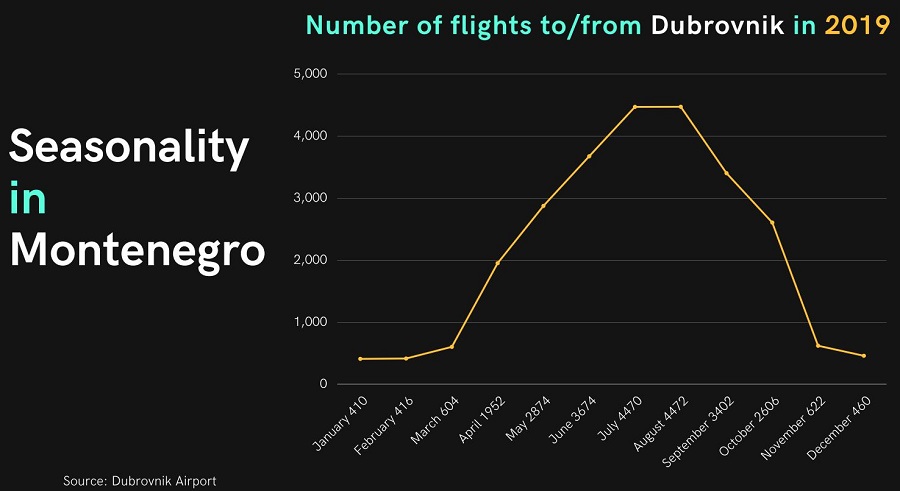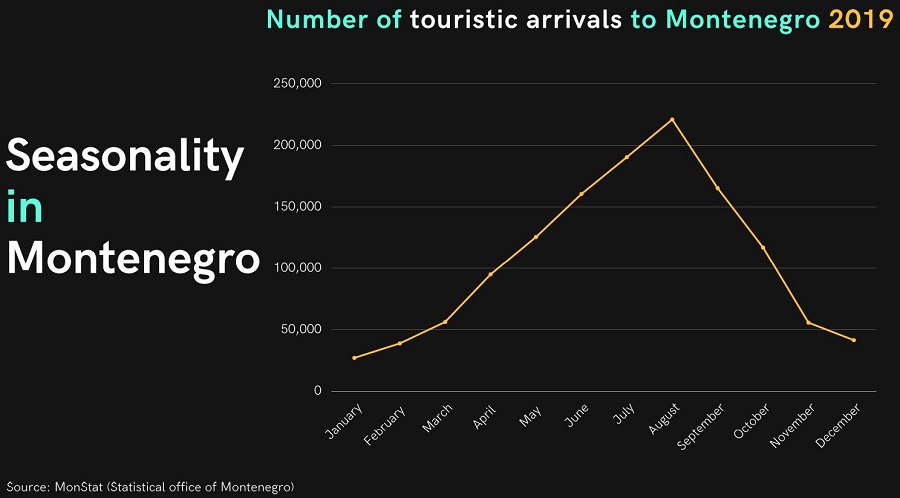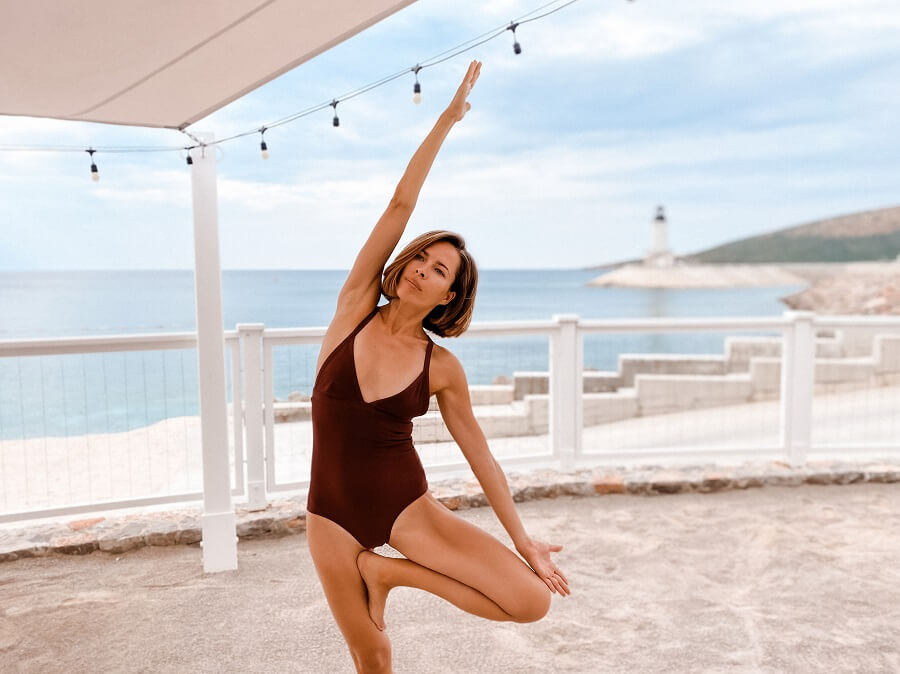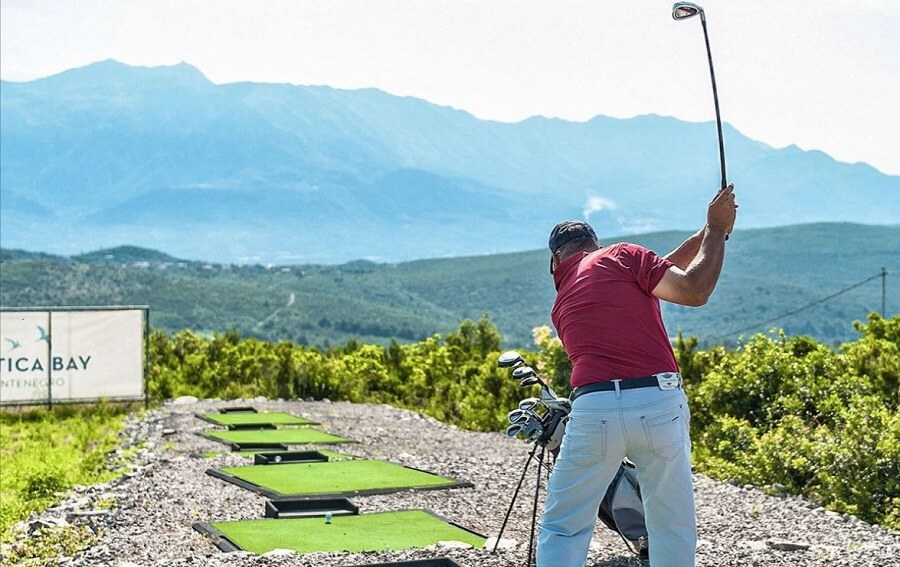DM Croatia Generates HRK 40m Net Profit
ZAGREB, November 12, 2020 - DM-Drogerie Markt Hrvatska, health & beauty retailer concluded the 2019/2020 financial year, which ends in September, with a total turnover of HRK 2.25 billion, 2% more than the preceding financial year, and generated a net profit of HRK 39.86 million, the company reported on Thursday.
DM invested more than HRK 33 million in the 2019/2020 financial year for the modernisation of seven retail outlets. It opened three specialised departments for over the counter (OTC) medication and launched an online web shop.
"In a year when the entire community is faced with unforeseeable business conditions we maintained our trend in growing turnover and retained the trust of our consumers. During the past financial year DM stores had more than 79,999 buyers visiting its stores every day. We also recorded a sales growth in OTC products of 24.29%," DM Hrvatska director Mirko Mrakuzic underscored.
He announced that DM plans to invest HRK 74 million in the 2020/2021 financial year to develop its retail network, expand the range of products and update its stores as well as expand its range for online shopping.
DM is focused on protecting the health of its workers, says Mrakuzic adding that the average take-home pay in their stores amounts to HRK 10,399. He added that DM has thanked its employees for their efforts in these extraordinary circumstances by giving them a bonus gift card valued at HRK 1,650 and that 98 days of further training had been organised involving 750 employees.
DM has 160 retail stores in 61 cities in Croatia and 1,592 employees and is the only drugstore of this kind that has an online shop in Croatia.
Pandemic Has Affected Croatia-Russia Economic Relations, Forum Hears
ZAGREB, November 12, 2020 - The COVID pandemic has affected Croatian-Russian economic relations, with trade dropping 21% in the first seven months of the year, and the focus should be on turning the trend around, the Croatian Chamber of Commerce (HGK) said on Thursday in a press release on a Russian-Croatian banking forum.
In the first seven months of 2020, trade between the two countries totalled US$ 228 million, down 21% on the year. We must focus on turning the trend around and work together on returning to the volume of trade which used to exceed $2 billion, the online forum was told.
Banks must play a key role in that, said Josip Zaher, the HGK vice president for commerce and financial institutions.
Croatian Ambassador to Russia Tomislav Car said relations between the two countries were slowly becoming dynamic.
"Both the interstate and economic elements are looking forward, which is a message of encouragement to all of us. However, behind all that are people with their knowledge and ambitions," he said, adding that the embassy and the HGK's Moscow office were always at entrepreneurs' disposal.
Russian Ambassador to Croatia Andrey Nesterenko said all efforts must be focused on the normalisation of relations, with emphasis on banking.
In these difficult times it is very important to continue with activities and maintain continuity in relations. It is also important to learn from one another, exchange ideas and thus find new opportunities in this crisis, he said, announcing that the intergovernmental commission on economic cooperation would meet soon.
The forum's main topic was banking in conditions of the coronavirus pandemic.
Zaher said commercial bank assets at the end of June totalled HRK 444.3 billion, up 4.4% from the end of 2019, while bank profits plunged 48% annually.
The forum was organised by the Association of Russian Banks and the HGK, with the support of the Russian and Moscow Chambers of Commerce and Industry.
(€1 = HRK 7.5)
Milanovic Advocates Adoption of National Cancer Strategy as Soon as Possible
ZAGREB, November 12, 2020 - President Zoran Milanovic on Thursday met with representatives of the Croatia against Cancer initiative, an association of cancer patients, supporting their demands for the adoption of a national cancer strategy as soon as possible.
Croatia is the only EU member state that still hasn't adopted a national cancer strategy which would represent a model of true and more than necessary reform of the health system which Croatia has to implement with the aim of improving the outcome of treatment and ensuring patient rights guaranteed by the Constitution, the meeting was told.
The initiative's representatives warned that adopting the strategy would put Croatia in a position to use EU funds intended for the fight against cancer, which now is not possible.
Croatian Egyptologist's Book Published at University of Cambridge
November 12, 2020 – The book "A History of World Egyptology" published by the renowned Cambridge University Press features the work of a Croatian Egyptologist Daniel Rafaelic.
As Hina reports, the editors of the book are renowned scientists Andrew Bednarski, Aidan Dodson, and Salima Ikram, and Rafaelić is the author of a 60-page chapter.
"I met Rafaelic in Cairo and realized that he would be an excellent author who could give us an overview of Egyptomania and films about ancient Egypt from all over the world. His knowledge of the popular reception of ancient Egypt is astonishing," said Ikram, who invited Rafaelic to be one of the authors of the book.
It is the first book to provide an analysis of the history of Egyptology by country with a special emphasis on popular culture. Ikram hopes that this book will set new academic standards and become the basis of any future work on this topic.
Daniel Rafaelic's chapter, in addition to the expected films such as "The Ten Commandments" with Yule Brynner, "Cleopatra" with Elizabeth Taylor or "The Mummies" with Rachel Weisz, deals in detail with lesser-known German and Austrian silent films, which are then regularly shown in domestic cinemas. A particularly important part of his chapter is the screening of the almost forgotten film "Son of Samson/Maciste in the Valley of the Kings", which was shot in Zagreb in 1960, which is the only time that a film about ancient Egypt has been shot in Croatia.
"I feel extremely privileged to be in the company of the greatest contemporary Egyptologists, people whose top scientific work has been my basic literature for the last thirty years, especially during my study of Egyptology at the University of Manchester," Rafaelic said on the occasion of the book's publication.
"The opportunity to bring our Croatian scents and colors into such a club fills me with indescribable happiness. The opportunity to reveal to the world a part of their, but also our film history, is unique in life," he added.
To read more news from Croatia, follow TCN's dedicated page.
No Worries, You Can Now Leave Your Greenery at Djardin Hotel For Plants in Zagreb!
November 12, 2020 - When you think of an international hotel, what pops into your mind is probably vacation in a luxurious room with a jacuzzi. However, Zagreb recently received a brand new cool place - the first hotel for plants called Djardin! It is a project initiated by the awarded Croatian designer Marita Bonačić, the winner of numerous world awards, among which Red Dot stands out.
"So, you bring the plant, we register it and record the condition (there are conditions in which we cannot receive the plant because, for example, there are pests and it is dangerous for roommates), but if the examination is successful, you will receive a confirmation and we will keep it for a certain fee, and caress it until you come for it", Marita explains how hotel for plants works.
Marita says that this idea came about quite spontaneously and unplanned because customers complained that their plants were dying because of inadequate care and ignorance, but also that they had no one to leave them with when they were on vacation, which is why they avoid decorating their home with greenery. Except on vacation, you can bring the plants for inspection or transplantation, but you can also buy some new ones.
"We offer outdoor plants, indoor plants, cut flowers, jars, exterior and interior decoration services for plants, plant maintenance services, transplants, storage, ie hotel for plants, plant rental and thematic workshops", Marita adds.
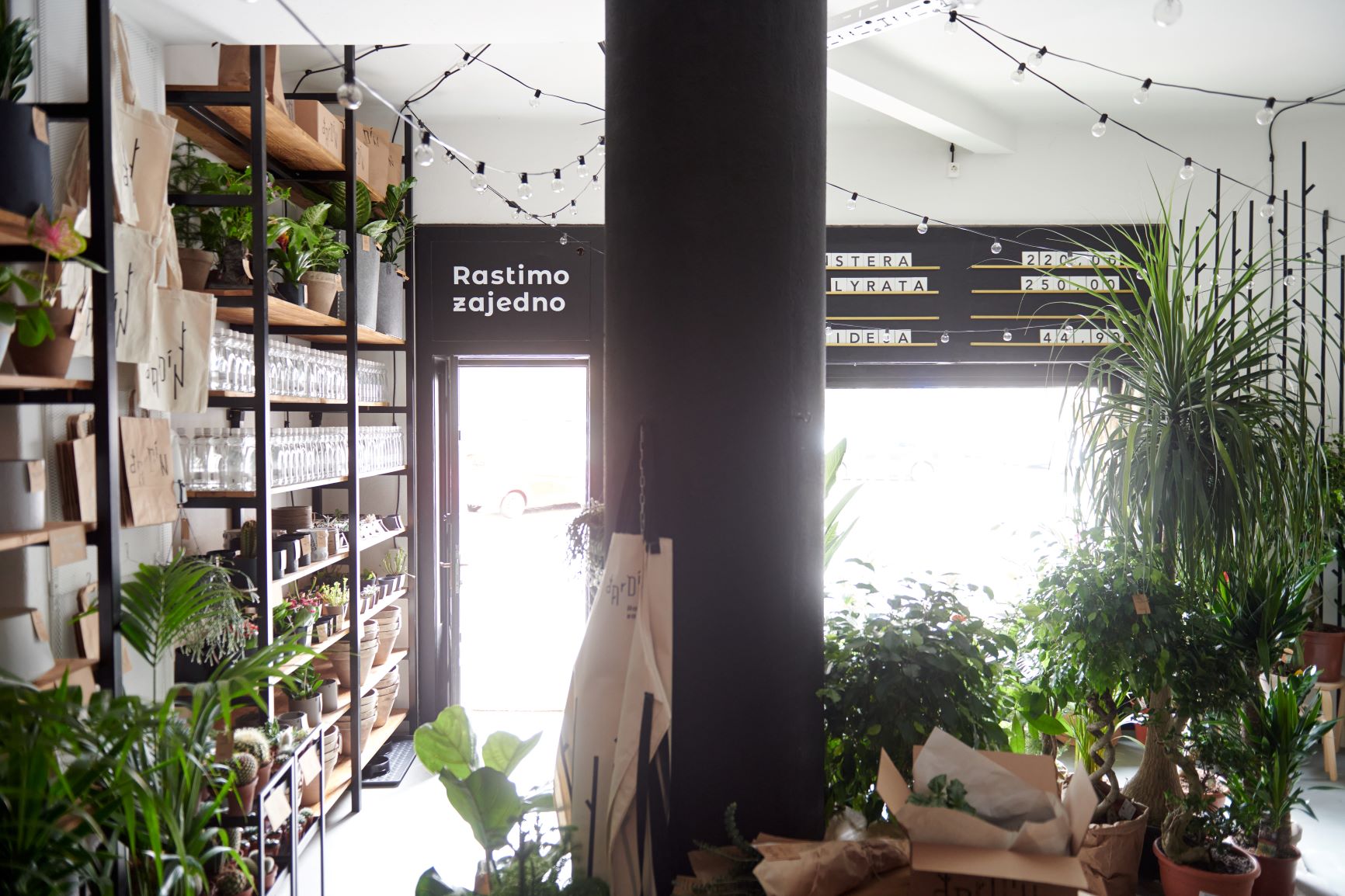
In addition to the above, there is also a walk-in Garden option. This means you can walk through Djardin even with your pet, enjoy the beautiful green oasis, read or hang out over coffee or tea.
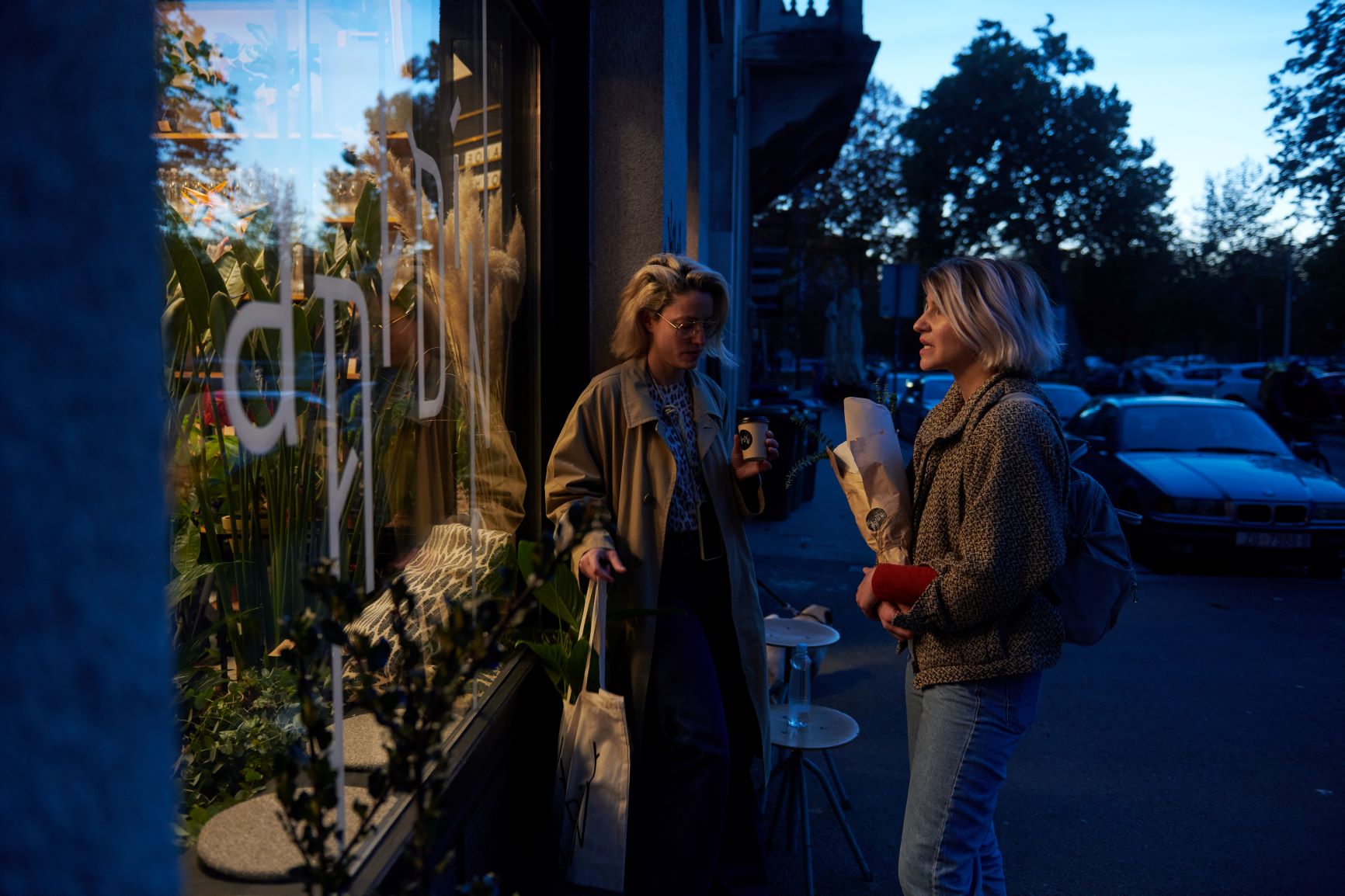
The organizers also plan to launch interesting educational workshops in which those who know a lot about plants and those who know little but share a love for plants and a willingness to learn, will be able to participate.
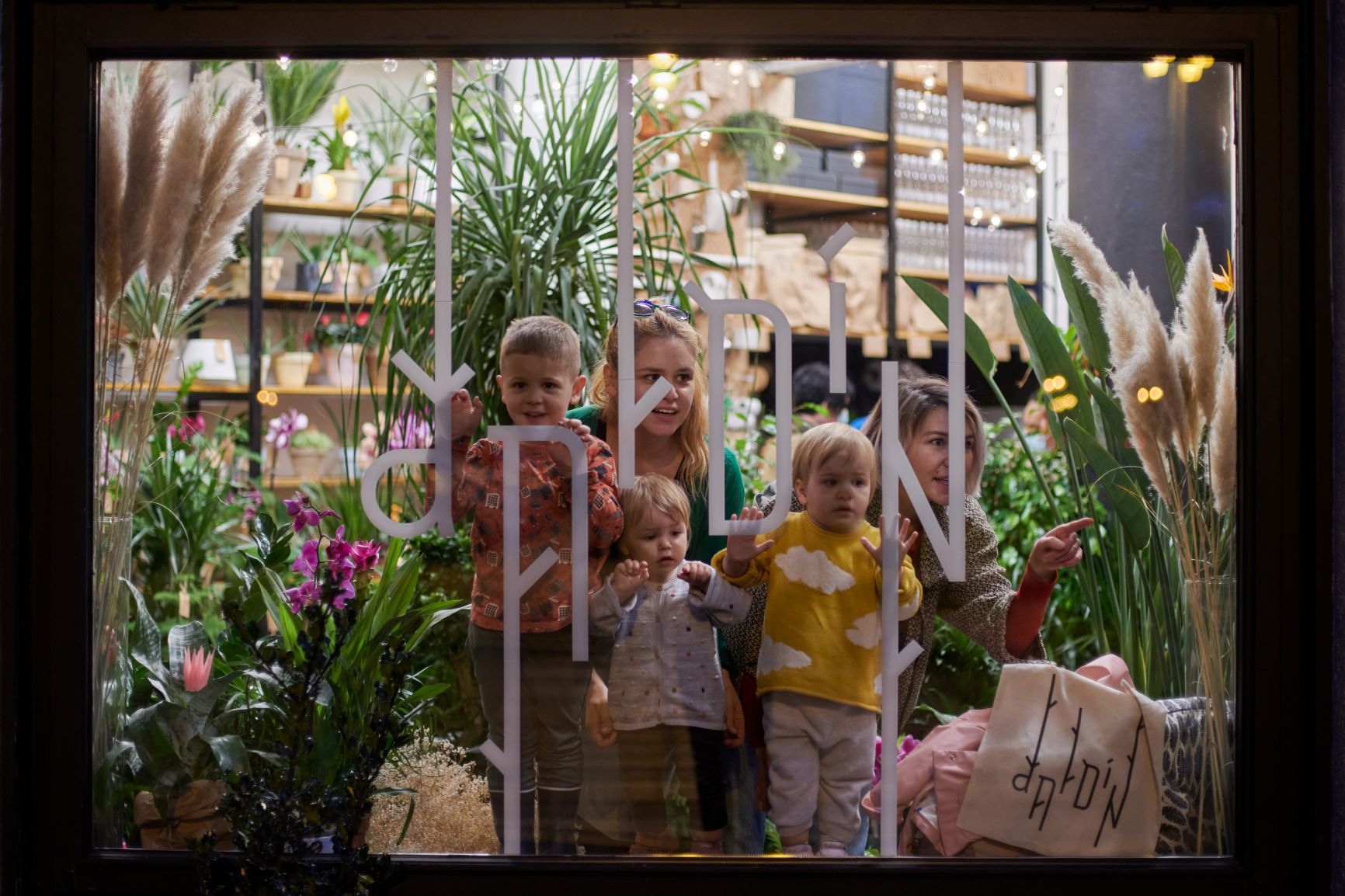
Asked if they are guided by eco-policy in their work, Marita claims that it is difficult to be zero-waste when the system is not ready for it yet, but she claims that they use sustainable materials in their work and encourage recycling and reuse.
"Our opinion is that plants love everyone equally and unconditionally, it’s just a matter of how to learn to give it back to them. We believe that really everyone can and should be the owner of the plant and the whole jungle of plants - we should be aware that those with 'green thumbs' weren't born that way, but developed an interest and got to know the plants. If you want to go that way, you can start by walking through our Djardin", Marita concludes.
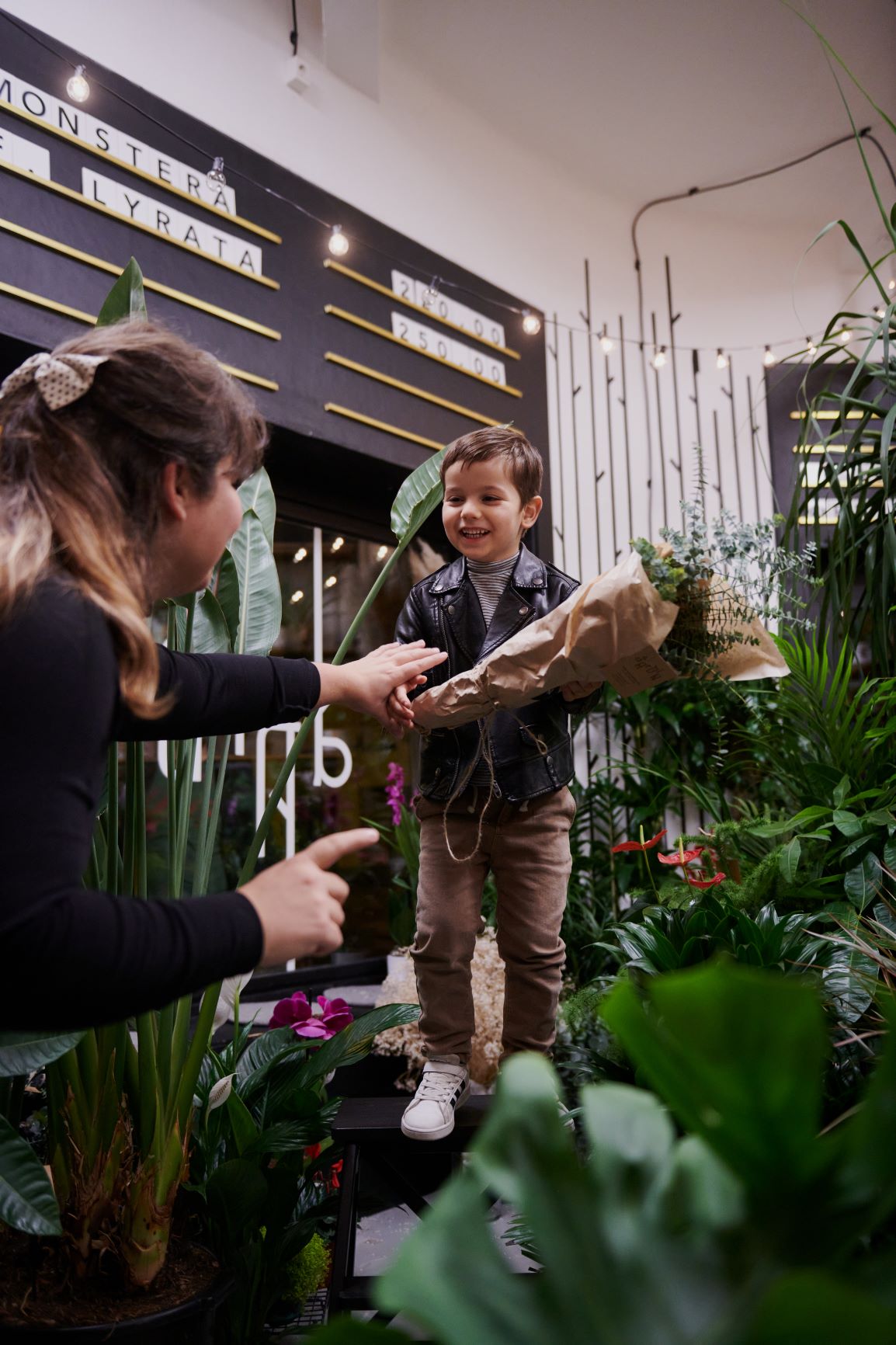
All photos © Nikola Zelmanović
For the latest travel info, bookmark our main travel info article, which is updated daily.
Read the Croatian Travel Update in your language - now available in 24 languages
Join the Total Croatia Travel INFO Viber community.
Drive-in COVID-19 Testing at the Split Port in Two Weeks
November 12, 2020 - Drive-in COVID-19 testing at the Split port will soon begin, and rapid tests should soon arrive at the Institute of Public Health, the director of that institute, Zeljka Karin, announced.
Index.hr reports that there are about 900 patients a day being tested, and drive-in testing will soon open in the port of Split, which should relieve the queues at the hospital and the county's Public Health Teaching Institute. Split should receive rapid tests that will need to be validated first, she said, adding that these tests will be done in closed collectives where a quick result is important.
"These tests are valid for a person who has a strong clinical picture to see if it is positive. A negative result says nothing or is not relevant. We will use this where we have a large number of people with a clinical picture so we can immediately put all people in self-isolation," Karin explained.
She reiterated that residents of Split-Dalmatia County could order testing online or through a family doctor. Citizens can now be tested at the Split Clinical Hospital in Krizine and the Teaching Institute for Public Health, and in two weeks, the port of Split.
Apart from Split, testing is done in Vrgorac, Imotski, Makarska and Sinj, and on the islands of Hvar, Brac and Vis.
Regarding the county's epidemiological situation, the head of the Clinic for Infectious Diseases, Dr. Ivo Ivic, said that the numbers they can handle are satisfactory and that the situation - if such a trend continues - can be well controlled. They have planned for many patients and can activate an additional 30 to 40 beds within one day.
"We have not yet filled the capacity, but we are ready for an additional increase. We currently have 170 beds; if necessary, we will expand within Krizine. The epidemic is no longer at the pace it has been in the previous two weeks. This can be seen by the number of new cases in the country. A plateau has been reached, and this is not because the virus has changed. We need to be aware of that," he said, adding that he believes the measures have paid off.
Regarding the new vaccine against coronavirus, Ivic said that it is great and that its effectiveness will be achieved only when enough people are vaccinated. He pointed out that in the next six months, we will do everything we can to protect, reduce gatherings, and prevent the spread of the virus wherever possible. When asked what he thinks about Advent events, he answered that it will be better to have fewer of them and that the measures should be strictly followed.
"It is impossible to stop life; a lockdown can be done once and never again. I mean, then it must really mean that we are preparing for a catastrophe," Ivic concluded.
To read more about coronavirus in Croatia, follow TCN's dedicated page.
Plenkovic Unveils National Development Strategy Until 2030
ZAGREB, November 12, 2020 - Prime Minister Andrej Plenkovic on Thursday unveiled a proposal for the national development strategy until 2030, saying that ten years from now he saw Croatia as a competitive, innovative and stable country of recognisable identity and culture, with preserved resources, good living standards and equal opportunities for all.
In circumstances of globalisation, over the next decade Croatia must use its competitive advantages and focus on sustainable economy and society, on increasing resilience to crises, on a green and digital transition, and balanced regional development, the prime minister said.
The goals include realising the potential for development, mitigating the consequences of the economic crisis caused by the coronavirus pandemic, promoting sustainable and stable development, improving living standards and ensuring equal opportunities for all people.
Plenkovic said that ambitious and realistic indicators were developed for all these components.
The proposed national development strategy will be put to public consultation over the next 30 days, after which it goes before the government and parliament.
Plenkovic expressed hope that the strategy would be adopted with a broad consensus and support.
Dr Markotic Nominated for EU Scientific Advisory Group on COVID-19
ZAGREB, November 12, 2020 - The Croatian government on Thursday nominated Dr Alemka Markotic as a member of the European Union's future scientific advisory platform on COVID-19.
Markotic is the head of Zagreb's Fran Mihaljevic hospital for infectious diseases, a professor at the School of Medicine in Rijeka and a member of the national COVID-19 crisis management team.
The platform will soon be set up at the proposal of European Commission President Ursula von der Leyen.
The platform will include a group of respectable doctors and researchers from all EU member states whose task will be to ensure a better, faster and coordinated exchange of scientific data and expert opinions as well as practical experience at the EU level.
Lessons from Montenegro: Wild Beauty & The 'Old Normal' at The Chedi Lustica Bay
November 13, 2020 - What to do when the planes stop flying and traditional tourism markets dry up? An innovative shift in focus at the Chedi Lustica Bay, and some lessons from Montenegro in how to reinvent tourism.
"Luxury means different things to different people," a friend said to me recently "For me at the moment, luxury means nature, space, fresh air and outdoor activities."
Things we used to take for granted, I thought to myself later - particularly those who were forced to endure weeks of urban lockdown earlier this year (and in some cases, once more this winter). COVID-19 seemingly has no preferences of victim based on importance, reaching the highest officials in 10 Downing Street and The White House, to name but two. Nature, fresh air, space, privacy - a chance to breathe and return to the old normal. That really is luxury, I agreed, before putting on my mask once more as I entered Zagreb Airport.
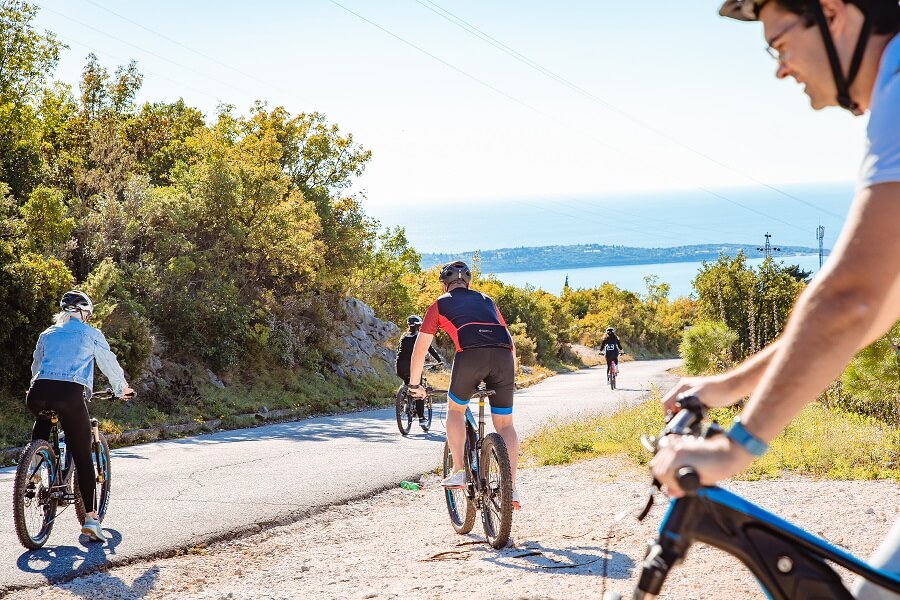
I was on my way to Montenegro, staying at The Chedi Lustica Bay where I discovered first hand how they are currently navigating the hotel industry’s troubled waters. The hotel wanted to show me how they were adapting to the considerable challenges of the new reality. The weather was spectacular, they promised, and a quad bike tour of the peninsula would be a highlight of the year. Looking out of the window at one more drizzly grey afternoon in Varazdin, I didn't take much convincing, and we made plans for a 3-night stay, with me flying down to Dubrovnik.
Longterm readers of TCN may recall an article I wrote soon after my first visit to Lustica, back in February, 2018. Back then I was stunned that such a project could actually be getting off the ground in the Balkans when I had spent years watching major foreign investments in Croatia get strangled by paperwork, bureaucracy and corruption. And yet here, across the border, a visionary Swiss-based business was investing 1.1 billion euro to develop a prime piece of real estate. The 7 million m2 plot on the Lustica peninsula would be home to no less than 7 luxury hotels, a new village of 2,500 people, two marinas and an 18-hole golf course. The project, done in partnership with the Montenegrin government, was moving forward at speed. Crucially, with such a large amount of land, the investor was in total control of the design of the space. If he wanted to build an experience that focused on peace, beauty, nature and stress-free living, he had no neighbours he needed to negotiate with.
And that is exactly what is happening at Lustica Bay.
It was an experience which led me to write one of my most discussed articles ever on TCN (even at ministerial level in both Croatia and Montenegro) after that first visit - Lessons from Montenegro: Why Luxury Lustica Bay Will Never Happen in Croatia.
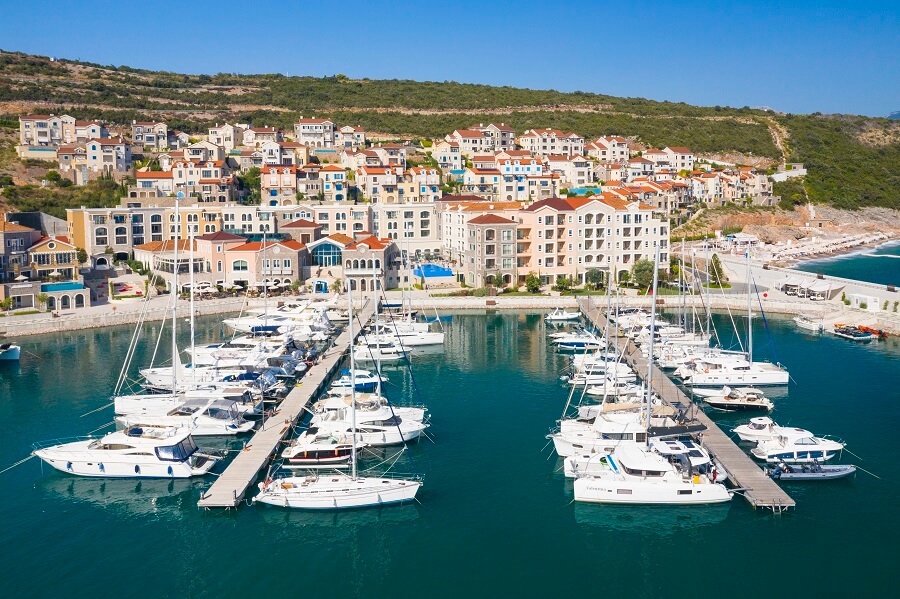
During my first visit to Lustica almost three years ago now, I encountered what was essentially a building site, and I remember laughing when I was told that the luxury The Chedi Lustica Bay would open in July that year, especially when reverting back to my experience of such projects in Croatia. But open in July it duly did, and progress since then has been more than impressive, despite the slowing brakes of the corona era.
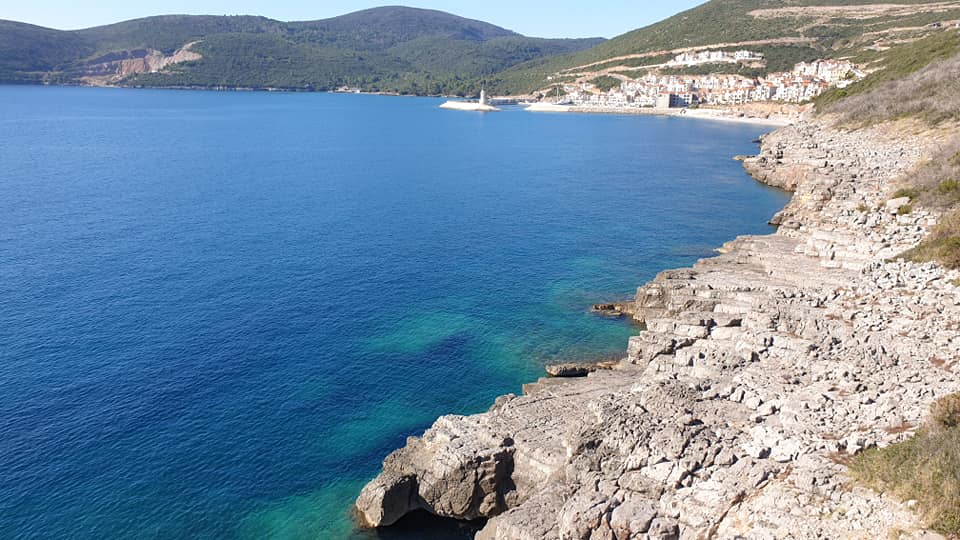
To be honest, when the hotel contacted me, I was surprised that the Chedi Lustica Bay was even open in mid-November, especially in this crazy year which has ravaged tourism all over the world.
One of the challenges of tourism in both Croatia and Montenegro is seasonality. This chart of Lustica's most important feeder airport - Dubrovnik - gives a great indication of the seasonality of its tourism. And these statistics are from 2019, which was a normal year.
Understandably, the tourist arrivals mirror the frequency of flights. Take away the flights, and you take away many of the traditional tourism markets. Just ask Dubrovnik. While most of the rest of Croatia benefited from the lack of flights because neighbouring countries were forced to choose drivable destinations due to no flights, Dubrovnik was starved of tourist supply and registered just 12% of 2019 arrivals for the first 6 months of this year.
The situation was even worse for Montenegro. Not yet an EU member, some of its main markets were effectively killed for the year when Montenegro was removed from the EU list of safe countries. The 14-day self-isolation requirement on return made a holiday to Montenegro unattractive to all but the diehard fan. In 2019, 49% of tourists to Montenegro came from Germany, Russia and the UK alone, all markets which were effectively cut off for this year. Regional visitors made up just 9% of tourist arrivals last year.
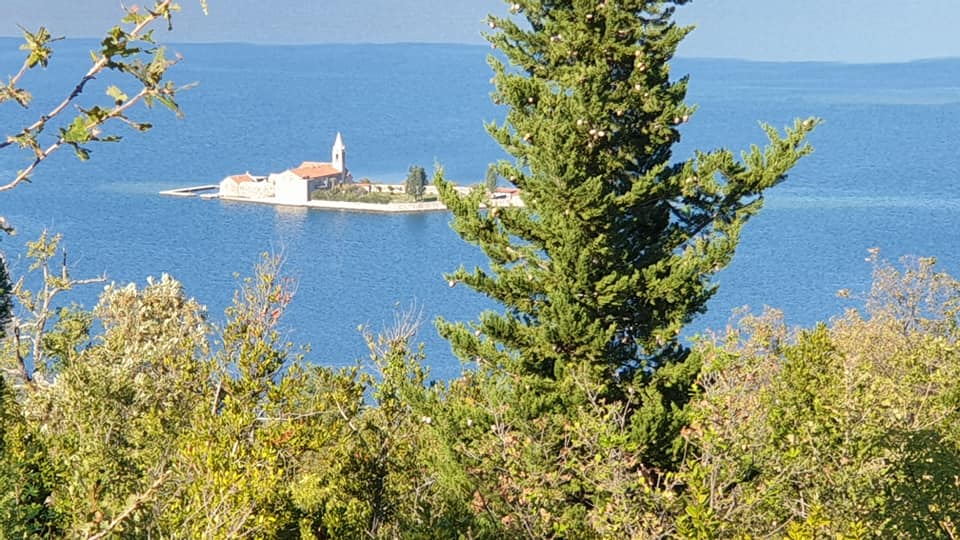
But regional tourists had one big advantage for those tourism businesses willing to seek them out - they could arrive by car. And while the average tourist from regional countries may not have as much disposable income as the Brits, Germans and Russians, there are a significant number of wealthy people in countries such as Serbia, Croatia, Bosnia and Hercegovina, Kosovo, North Macedonia and Albania. They, too, were perhaps planning to fly outside the region, and the lack of flights meant that they were a new target market. This is especially true in the winter months, when tourism locally is traditionally dead. Many tourist businesses close for the winter months on the Adriatic. It is the time of year when the owners relax after a long and successful season, and they fly off somewhere for an extended and well-earned holiday. With no flights this winter, the market is there for those with something to offer.
And the results were impressive. With tourism numbers necessarily much reduced, this year's regional visitors topped more than 80% of all arrivals (up from just 9% next year), with the 2021 forecast as things return towards normality projected at 60% for the hotel.
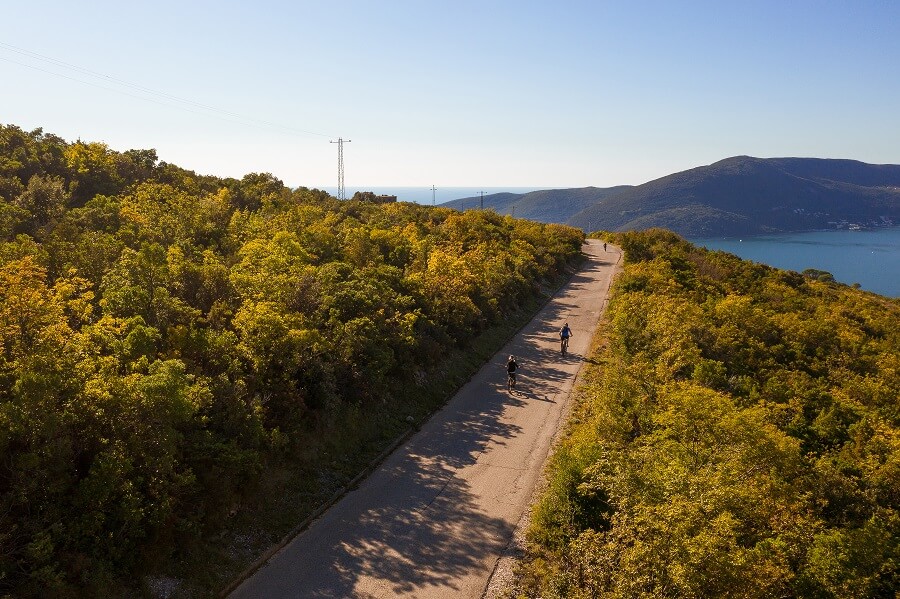
And, as I discovered during my latest visit to the Chedi Lustica Bay, there is plenty on offer against a backdrop of pristine nature, clean air, space and privacy. Luxury, my friend at the start of this article would call it.
So what is it that the Chedi is doing differently, remaining open all year, when many hotels in Dubrovnik did not open at all in 2020?
The two keys to its relative success are the amazing adventure playground which has no neighbours, as well as a management team not afraid to diversify and explore new avenues.
It is often said that the Montenegrin coast is overbuilt and its beauty compromised. While this is certainly true in places (look away now Budva and Herceg Novi), nothing could be further from the truth on the Lustica peninsula. It really is a bubble of positive vibes and unhindered beauty at every turn, quite unlike any other I have encountered on the Montenegrin coast. And, as I was to discover on my quad bike tour, it has a deceptively rich (and extremely healthy) tourism offer.
When I first visited The Chedi Lustica Bay in early 2018, it was still under construction. My impression was that this was an excellent project, but it was all a little isolated from the rest of the tourist action.
It was only on this visit that I began to fully appreciate the magic of the Lustica Bay experience, now that more has been constructed, and things falling into place. Far from being just a hotel, those 7 million square metres offer the complete Lustica experience, quite possibly one of the best such luxury experiences of space, nature, beauty and fresh air that exists in Europe today.
Using the hotel as a base, there are breathtaking opportunities for cycling on roads where you will encounter nobody.
Or yoga on the water, a calming way to start the day.
The 18-hole Gary Player golf course is not yet finished, but the driving range is open and very popular most of the year (open until November 15).
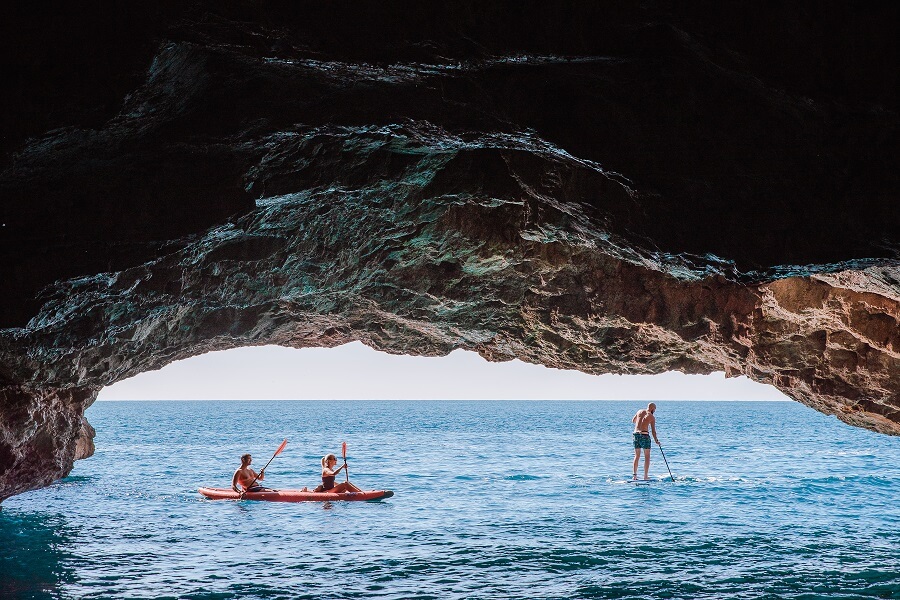
There were several people on the beach, and even swimming in mid-November, while the kayaks and SUP boards are available for use.
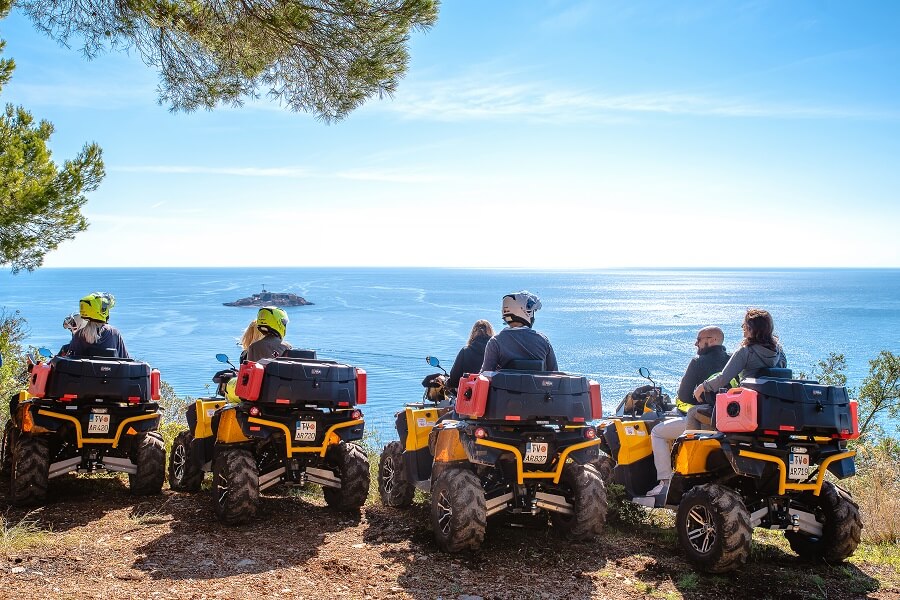
The fleet of quad bikes or e-bikes awaits, which can be rented either with or without guide. The quad bike guide is definitely worth it.
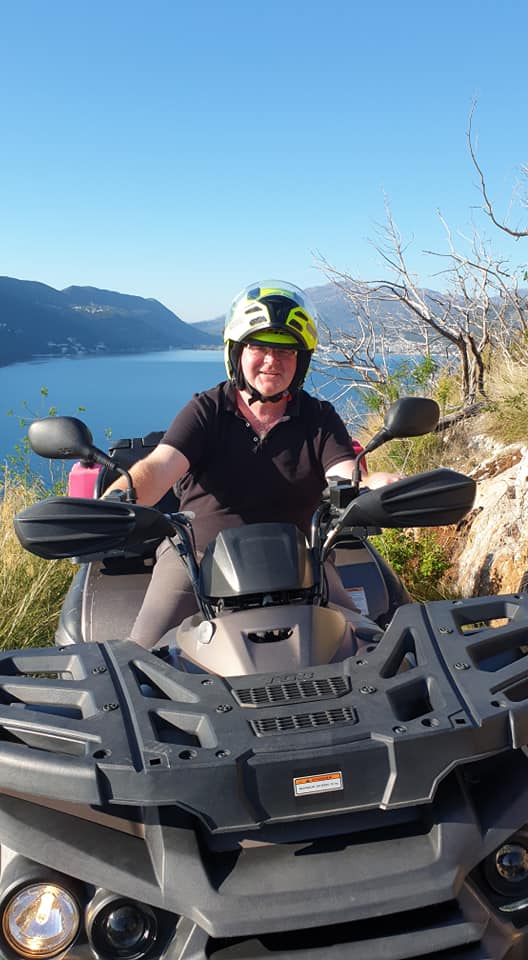
I have to confess I was a little nervous about taking the quad bike, a first time for me, but I was assured by the excellent (if slightly crazy) Chedi guides that this would be one memorable tour.
They were not wrong.
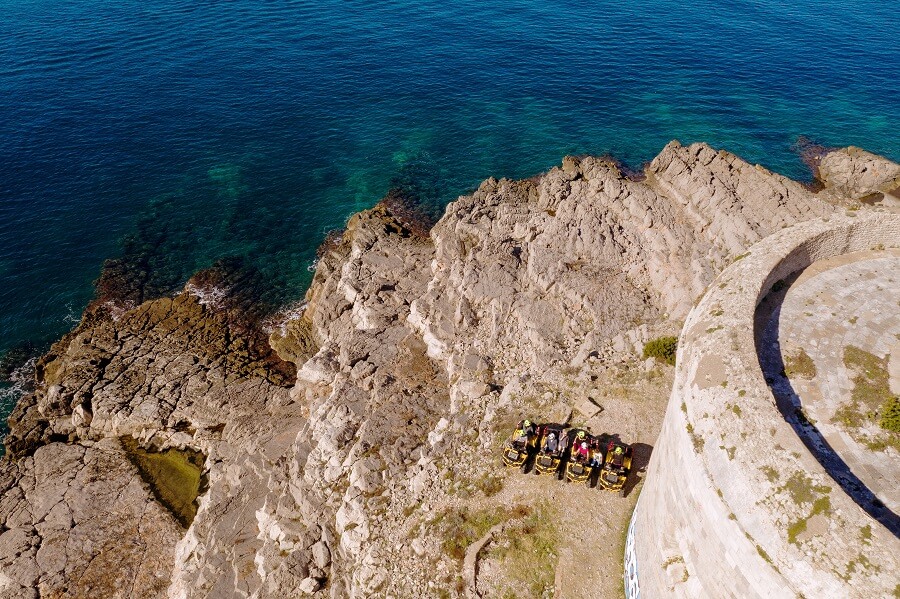
What an incredible way to explore the peninsula, at one's own pace and interest level.
Any thoughts that this might be a gentle tour sticking to the main roads were quickly dispelled, as we headed offroad for the first time, stopping occasionally to remove obstacles in our way (see above).
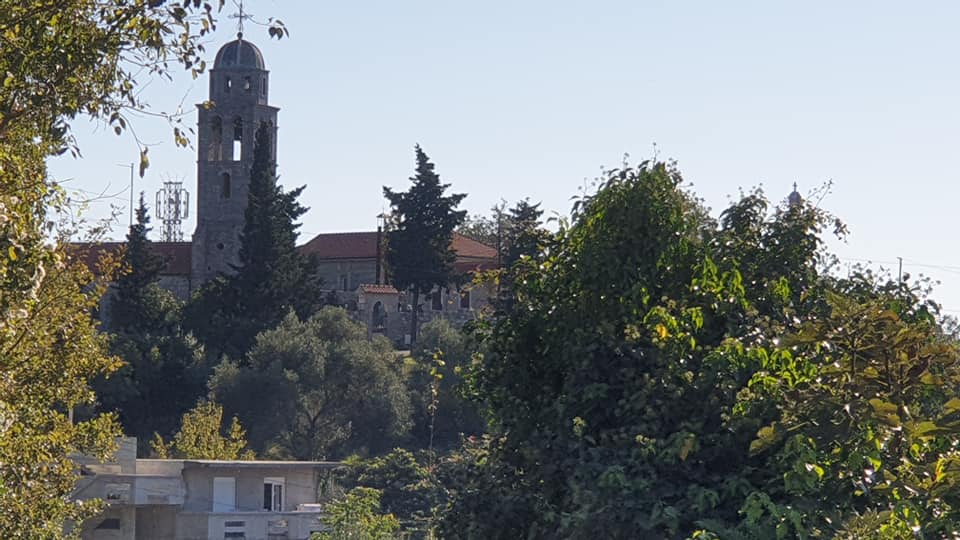
Time to admire the many beautiful churches to be found in Lustica villages.
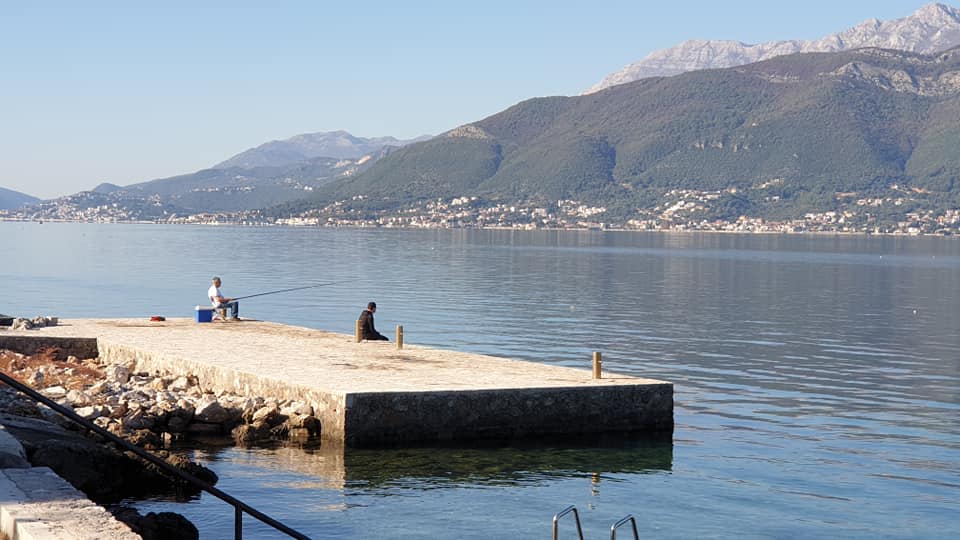
A chance to observe the relaxed local way of life - Montenegro in autumn on a glorious November late morning.
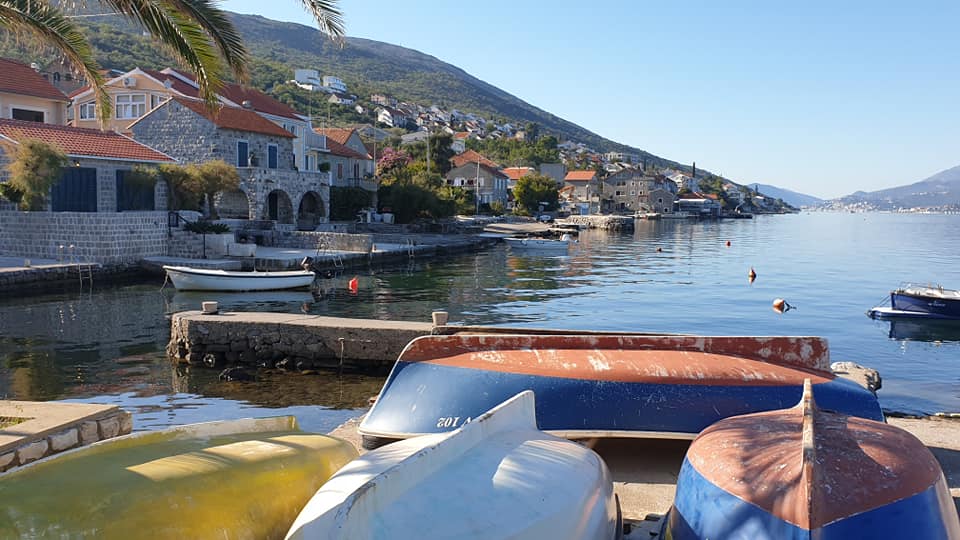
Driving through traditional waterfront villages, an oasis of calm.
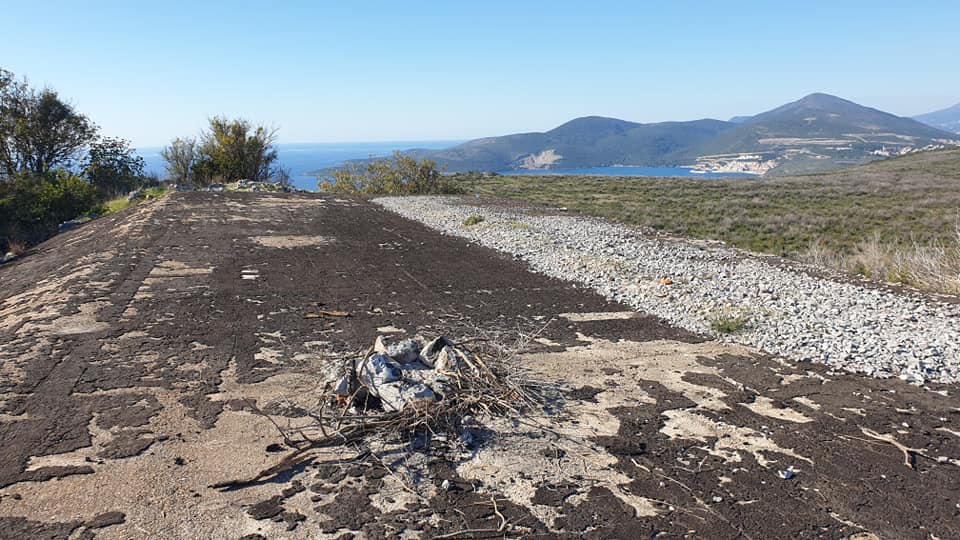
Our guide Milan was a Lustica local, passionate about his peninsula. He took us to some of his favourite spots where his friends like to go hiking, get away from the crowds, and enjoy barbecues in nature, such as this place by one of the Boka region's 85 fortresses, which were built by the Austro-Hungarians.
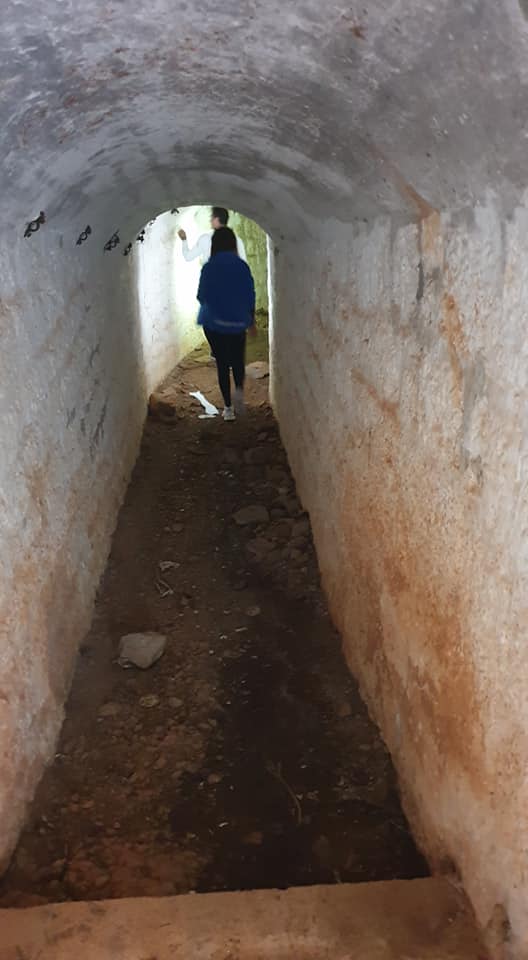
Fortresses which had their secrets, as Milan guided us through a 400-metre tunnel under the fortress at Grabovac.
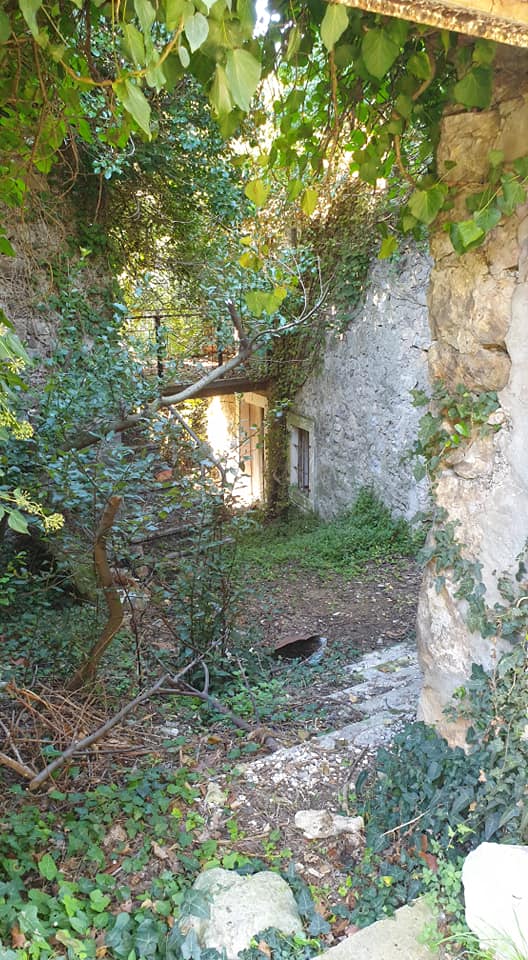
Sensing our appreciation of his tour, Milan took us deeper into his world, showing us the quaint stone villages, many of whose houses are sadly in a state of disrepair.
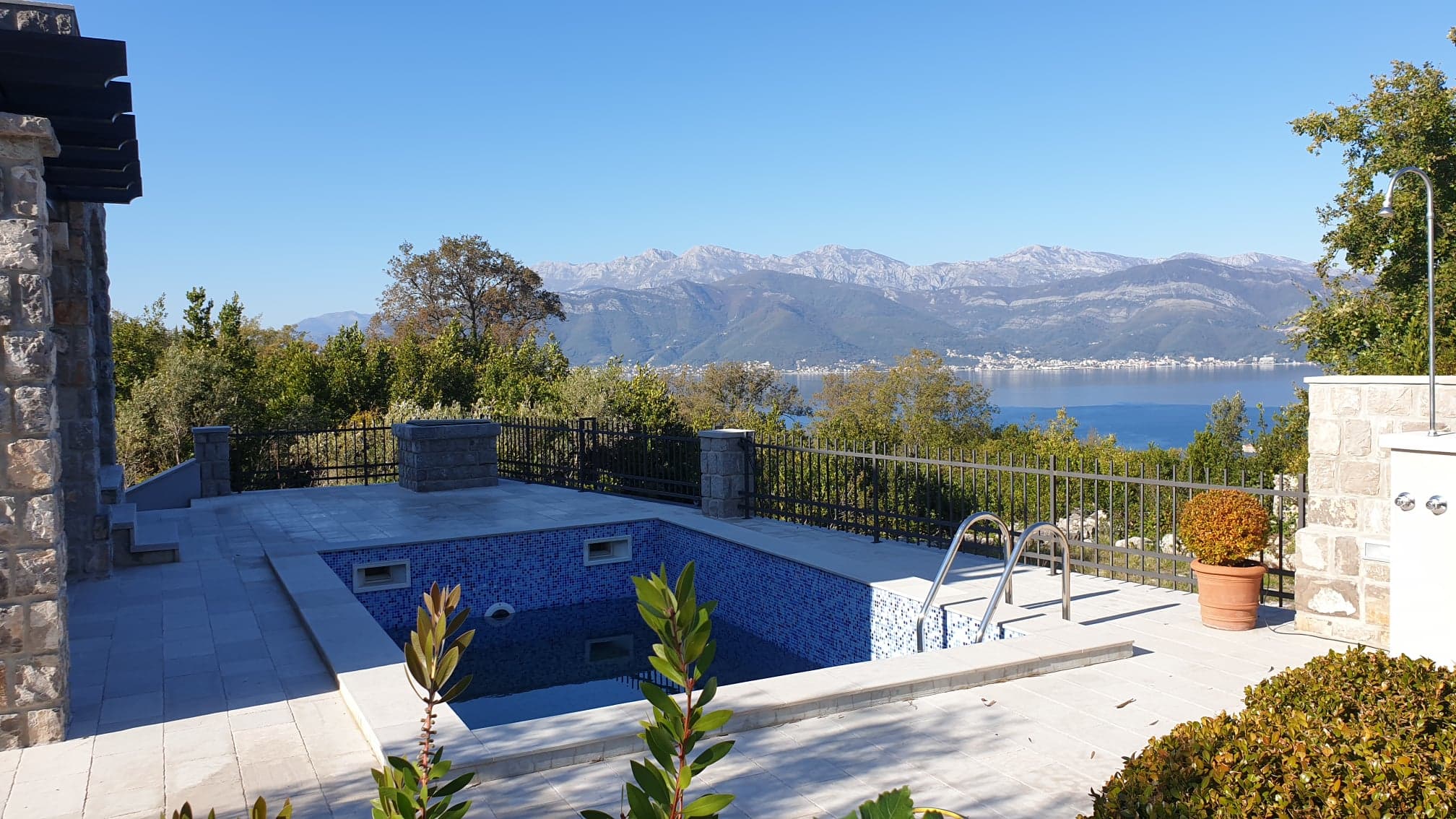
While others have been beautifully restored and offer stunning views surrounded by nature and no other people.
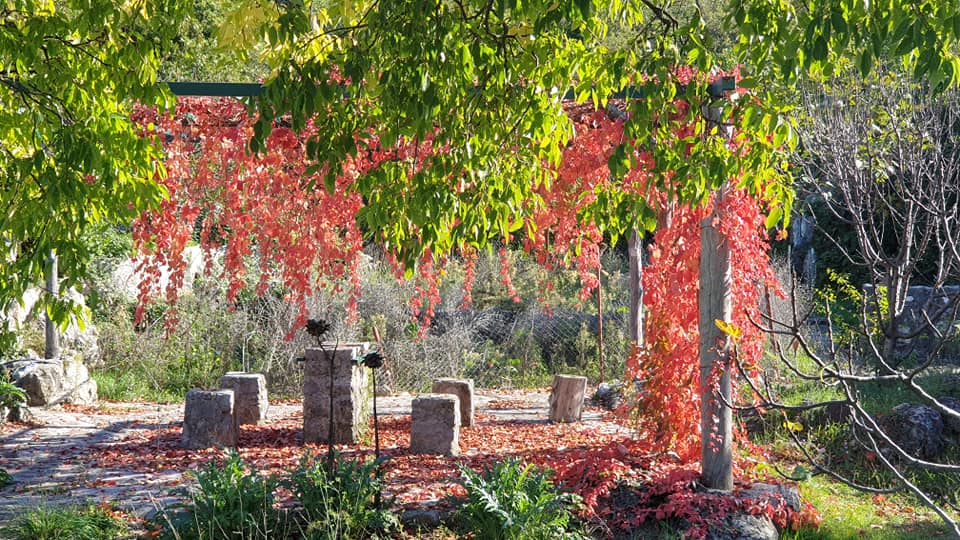
The colours of Lustica in autumn.
Wild beauty and the old normal. After months of stressing about - and writing about - the pandemic, it really felt that I had found a tiny bubble of natural freshness which harked back to how life used to be.
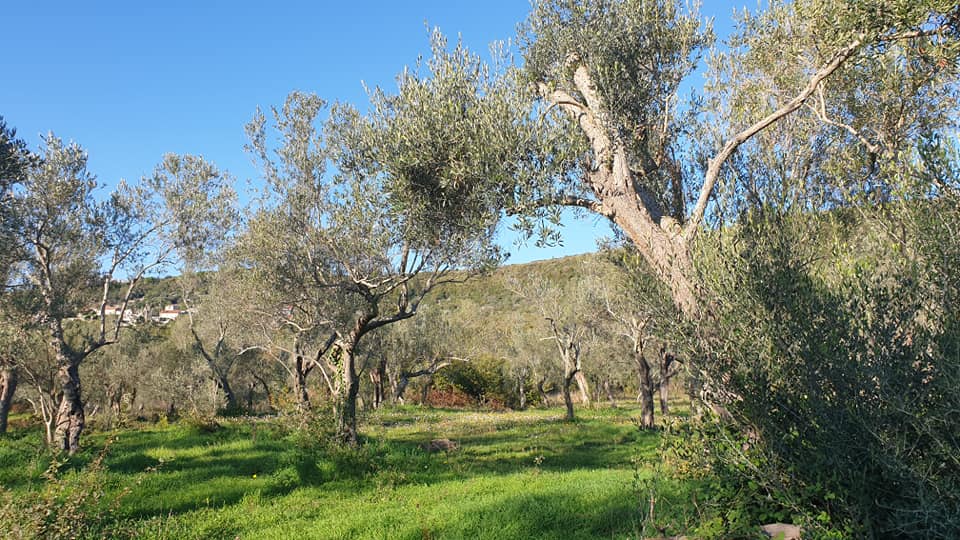
Onward we drove through the fields and past the olive groves from where Montenegro's exquisite olive oil hails. If you have the time and inclination, there are additional delights to sample, including olive oil tasting at the Moric family olive grove, as well as some quite sensational local cheeses produced by a Russian woman who moved to the peninsula 9 years ago.
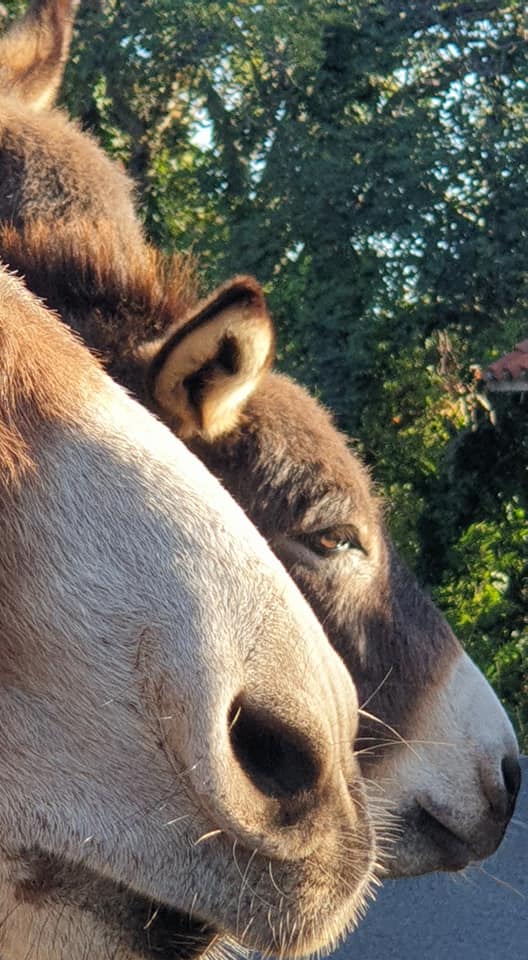
A little donkey feeding is also on offer.
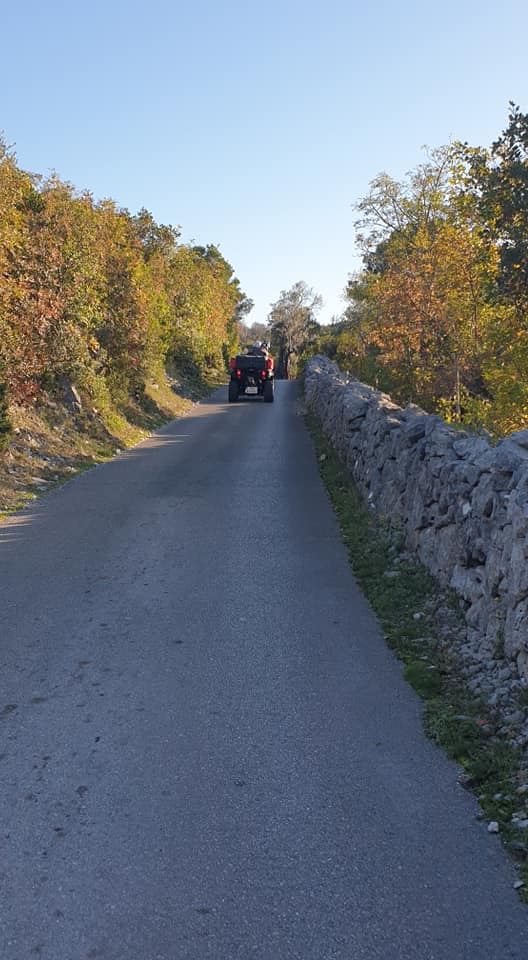
And everywhere, the dry stone walls lining the roads.
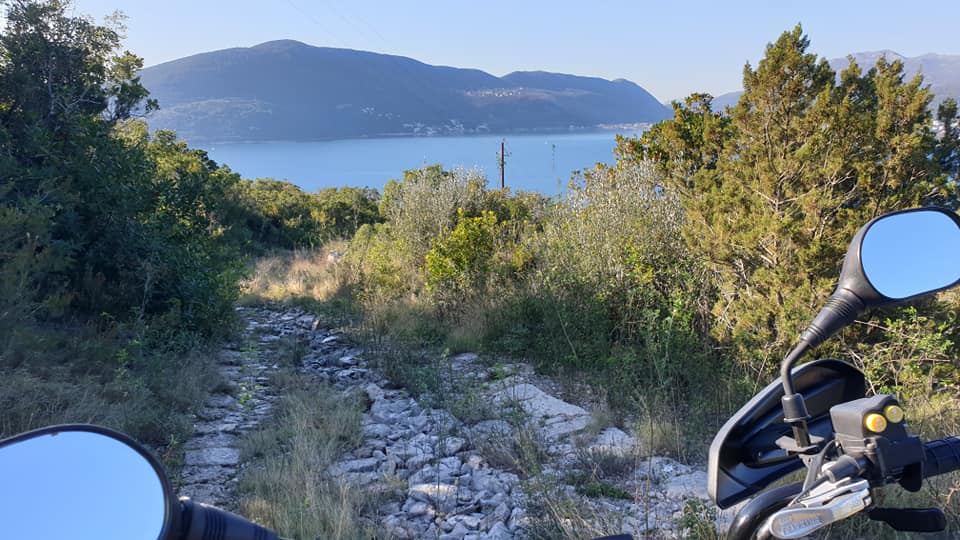
The Austro-Hungarian influence is strong in the Boka region, and not only due to the numerous fortresses. Masters of infrastructure, it seems that the Austro-Hungarians were ahead of their time, even laying the foundations a century ago of today's quad biking routes. Now we were going truly off-road.
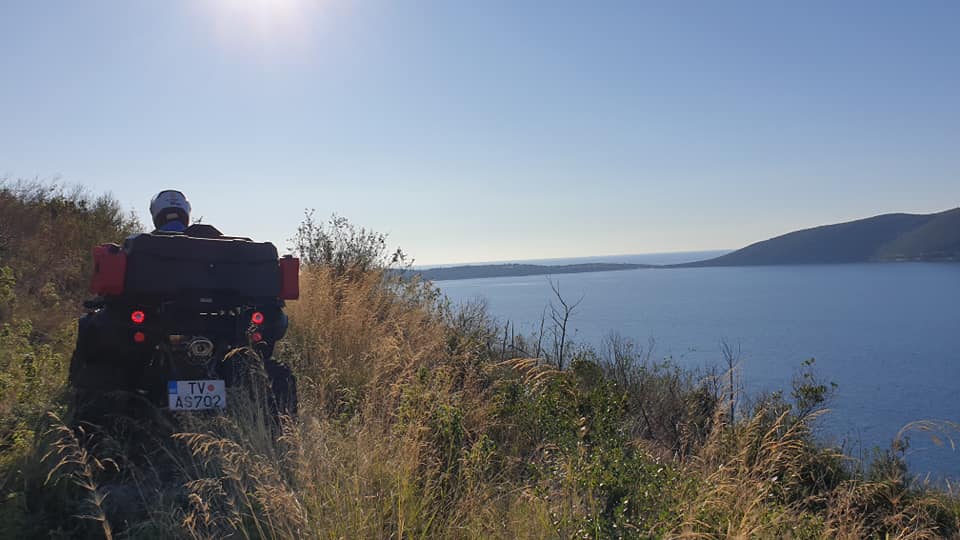
But if I thought that was as off-road as it was going to get, Milan had other ideas. For he knew of places of extreme beauty on his peninsula that the Austro-Hungarians had never come across. There didn't seem to be any road, so I just kept in the line behind the quad in front. The views were outstanding, as was the weather (21C in mid-November).
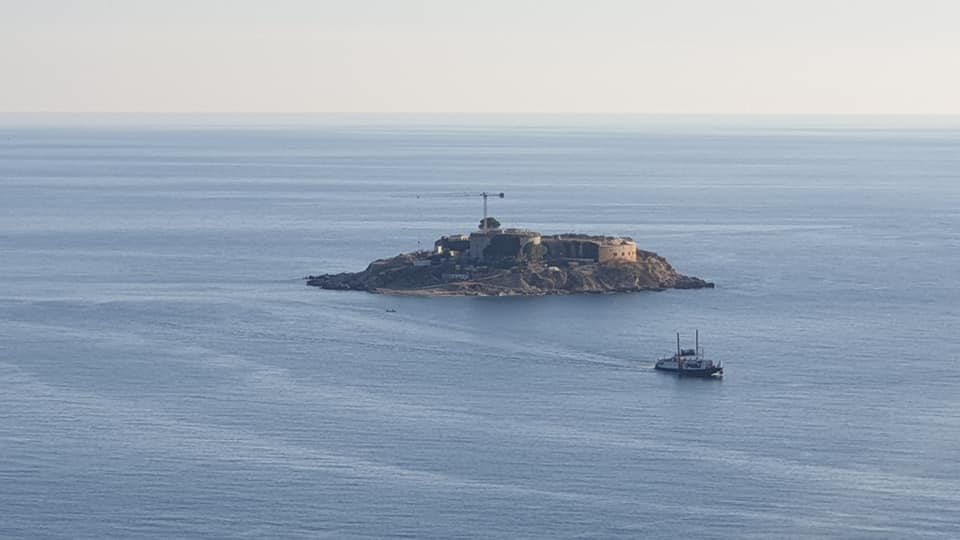
A view of Mamula fortress, which is on schedule to open as a luxury 5-star hotel next summer.
A tour I will never forget.
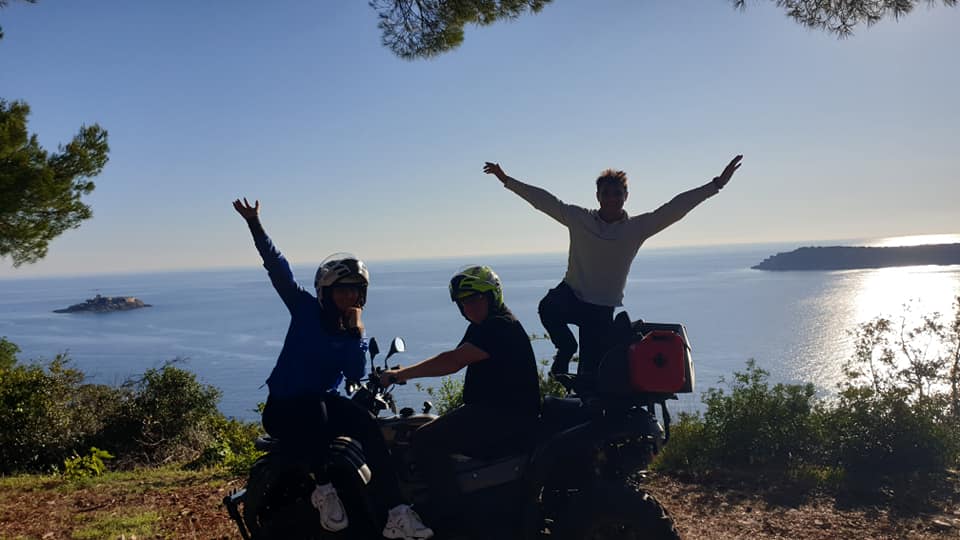
Huge thanks to crazy Milan and Tamara for their part in the best tourism experience of the year so far. Highly recommended.
The tour over, it was time to return to home base to sample the off-season offer of the Chedi Lustica Bay.
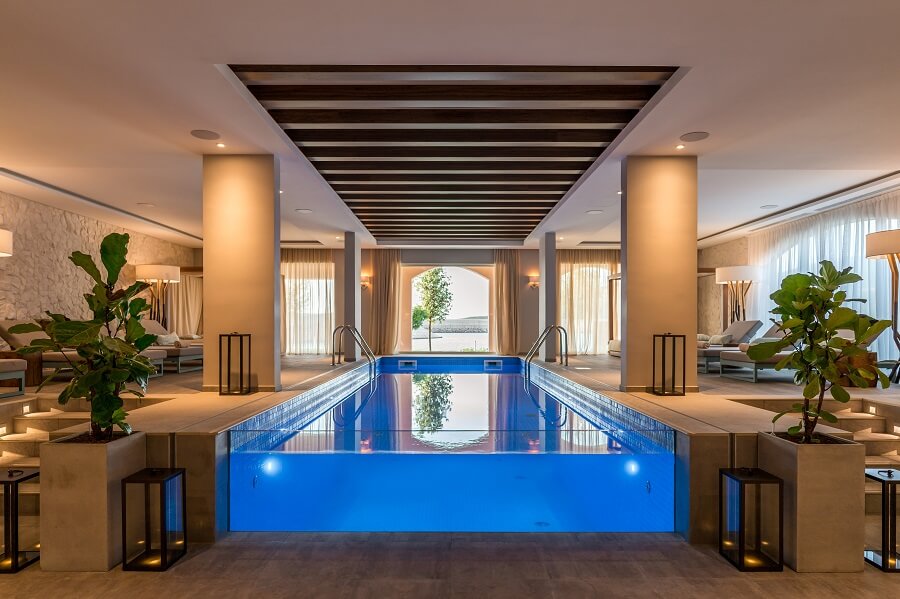
While there were other guests swimming in the outdoor pool, the indoor one was free.

During my stay, the 2020 World Luxury Hotel Awards were announced, and there was good news for the Chedi Lustica Bay, which was voted Best Luxury Coastal Hotel in Europe, Best Luxury Boutique Restaurant in Europe, and Best Spa Team in Montenegro. An impressive haul of accolades which I decided to investigate. Thumbs up for the Thai coconut prawn curry, an exotic dash on a menu which otherwise focuses on organic local produce...
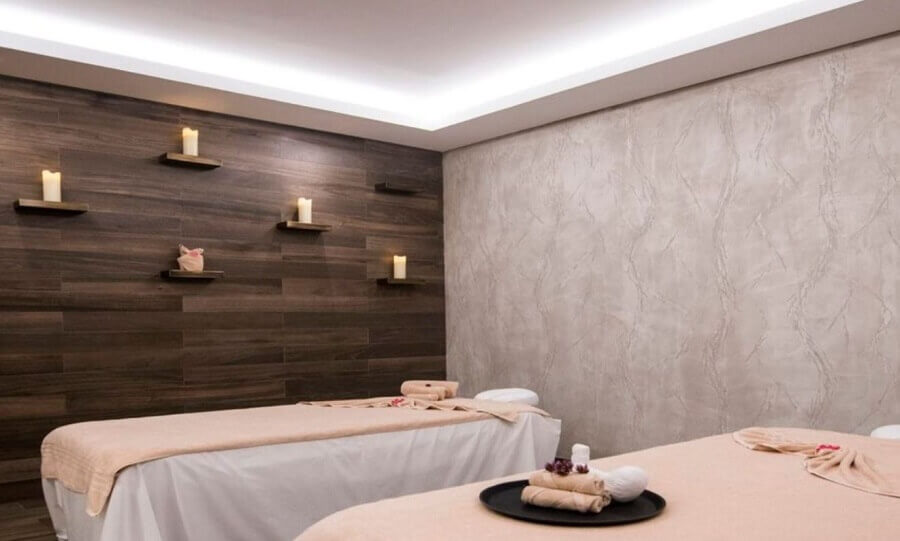
... from Thai curry to Thai massage. A relaxing way to recover from my quad biking adventures.
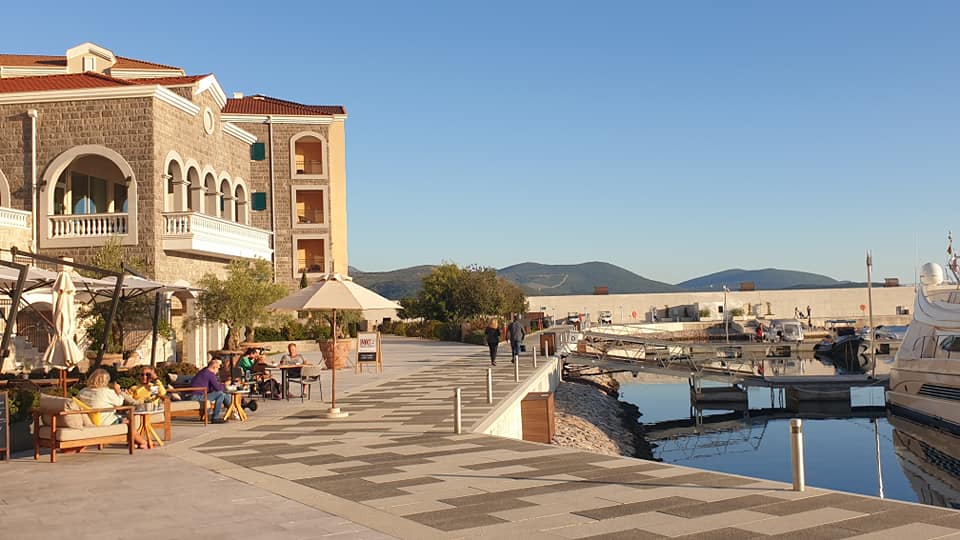
One of the challenges the Chedi team faces is attracting the local market. When Porto Montenegro opened in Tivat over a decade ago, it was understandably seen as a haven for rich foreigners, off-limits to locals. That perception has now changed, and the development is popular with locals, but I had the impression that this was how The Chedi and its marina village was viewed by locals.
That perception is also gradually changing as the marina village opens more shops and hospitality outlets, and as more locals came for a coffee and reported back. But that change in perception is also a result of the fresh approach from the hotel management, whose strategy is to increase the number of activities on offer. Not just the cycling, kayaking and quad biking, but also within and around the hotel itself, with locals more than welcome.
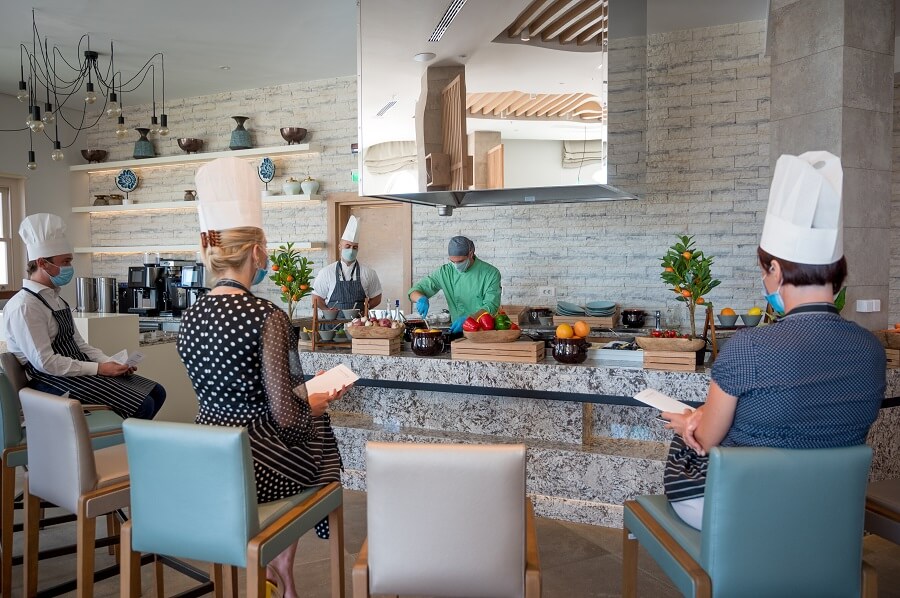
Cooking classes for adults on Thursdays.
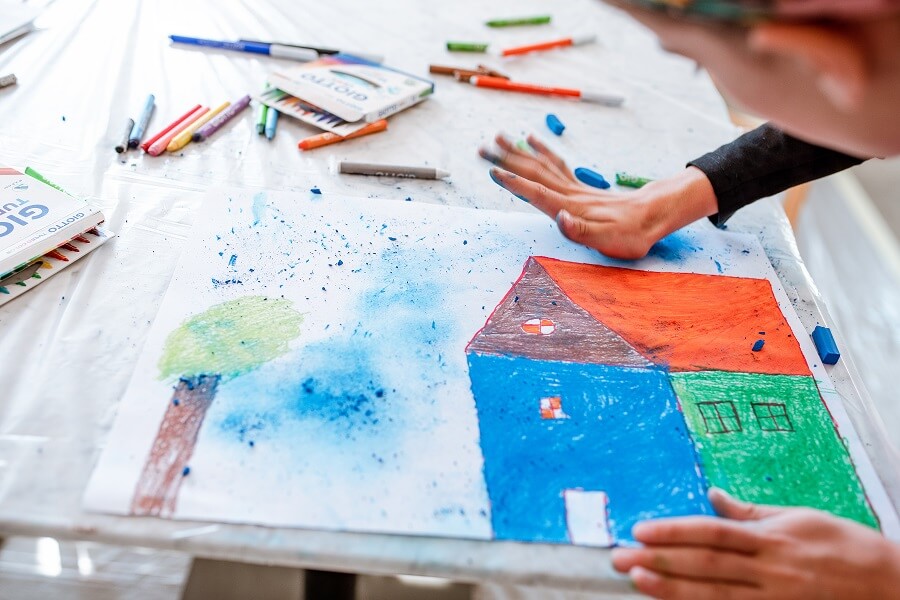
Cookie and art classes for kids at weekends.
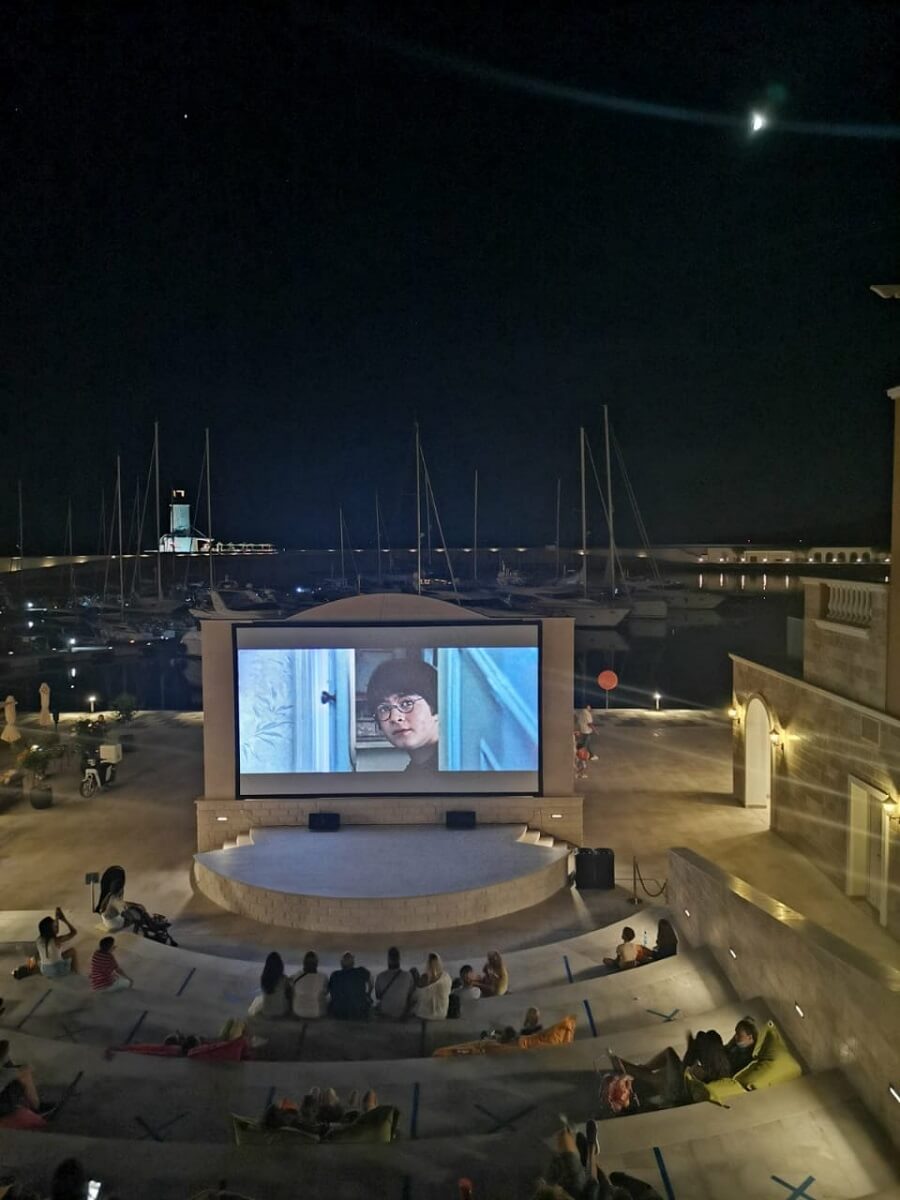
Free movie nights, including free popcorn, on Wednesdays. Sometimes these are held in the amphitheatre in the marina, a truly spectacular movie location.
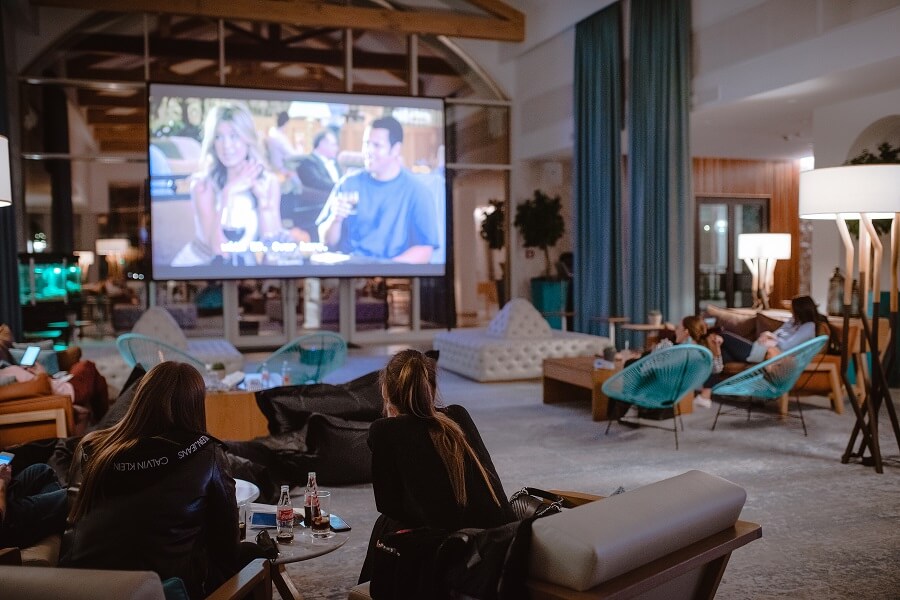
And sometimes in the hotel lobby, where guests are free to enjoy the comforts of the lobby and the big screen.
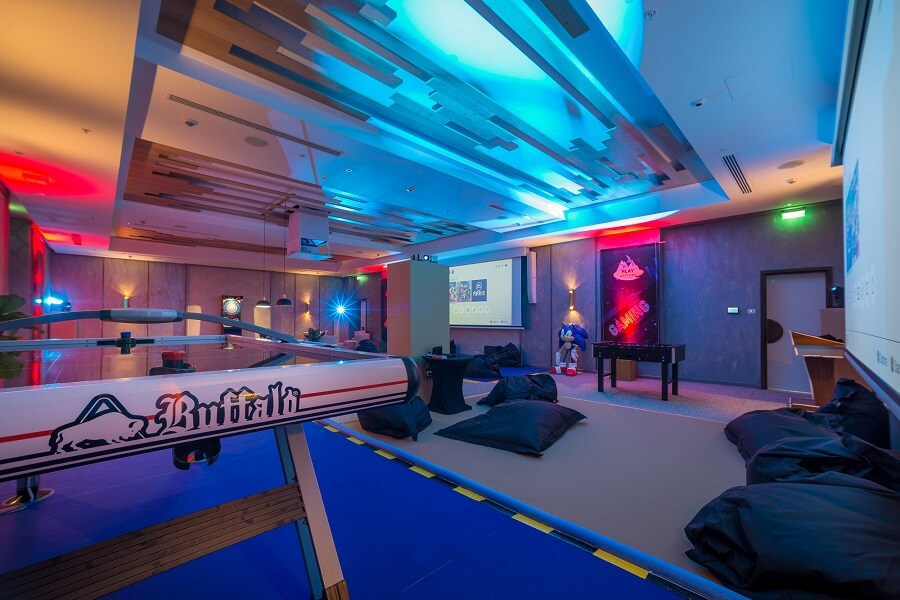
And the kids' entertainment is not weather-dependent, and the converted conference room has never looked so appealing or popular.
A quick video tour.
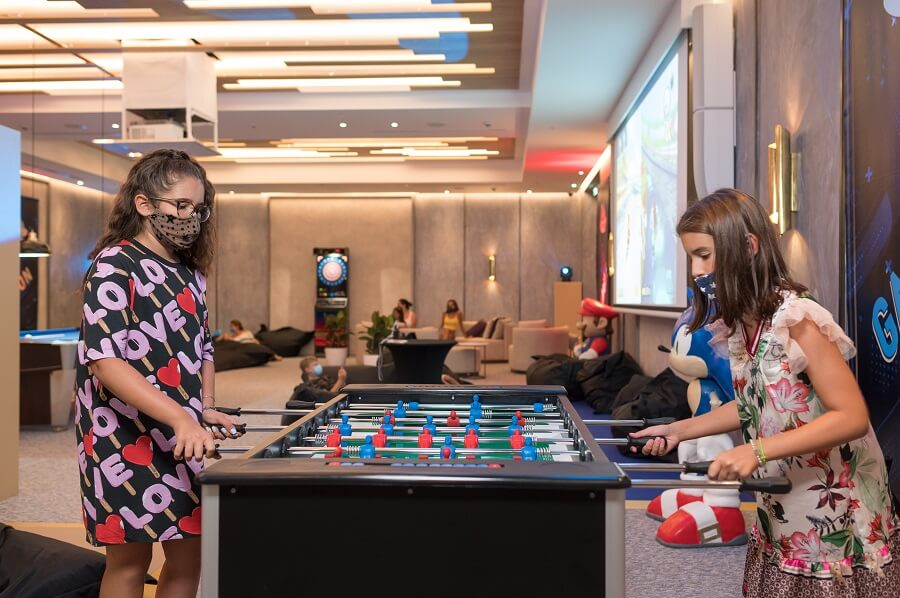
All these extra facilities are free of charge to hotel guests, and - in a nice gesture - also free to locals and anyone else who comes to the hotel and spends. Not a bad investment to relax in this waterfront oasis while allowing the little ones to explore and play.

And regional visitors are coming. Normally, they might have been eyeing a beach in Thailand and Sri Lanka this winter, but with those options no longer on the table, some fulfilling family fun with a touch of natural luxury is proving to be a pleasant if unpredicted alternative. One great innovation which I really liked is the hotel's resort credit - Book one or more nights in a seaview room in this active lifestyle destination starting at 199 euro and use the entire room rate as resort credit and stay for free. A little quad biking, kayaking, massage, movie nights and fine dining, with the accommodation thrown in for free.
And this new focus on activities seems to be working, with the hotel projecting much higher revenues from activities for next year. Interestingly, during my stay, a quarter of guests had signed up for an additional paid activity. Indeed, this overall shift in focus towards lifestyle, outdoor activities and the regional market is probably the best tourism response I have encountered on the Adriatic during this troubled year.
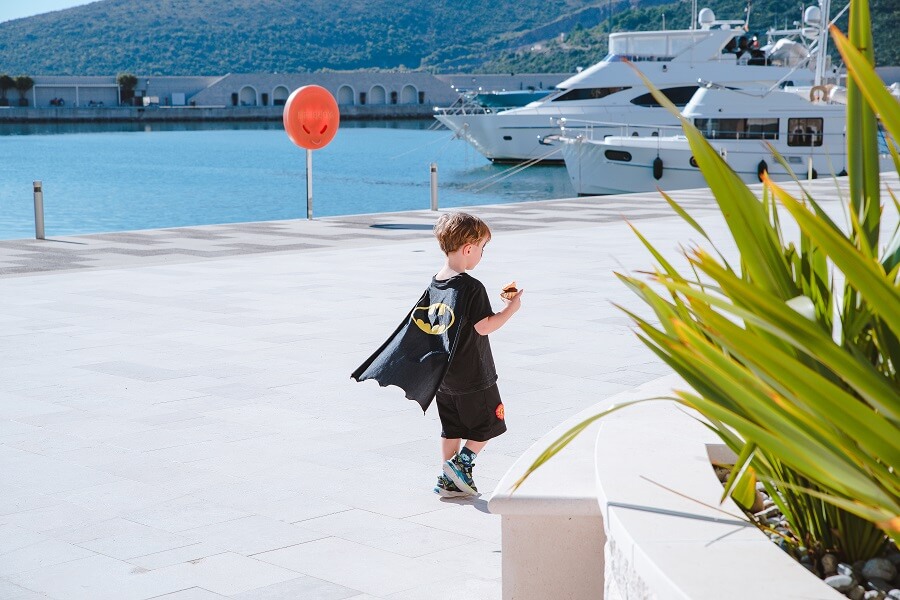
This has been a stressful year for us all, and I was not sure what I would encounter on my brief trip to Montenegro this time. But what stays with me some 48 hours later is that luxury. Not of the comfortable bed, the excellent views, the delicious food, the memorable activities. But the luxury that my friend mentioned at the beginning - nature, space, fresh air privacy. It really felt like the old normal, the things we used to take for granted. Lustica Bay is a bubble, no doubt, and the energy of the people living and working there rubs off on you.
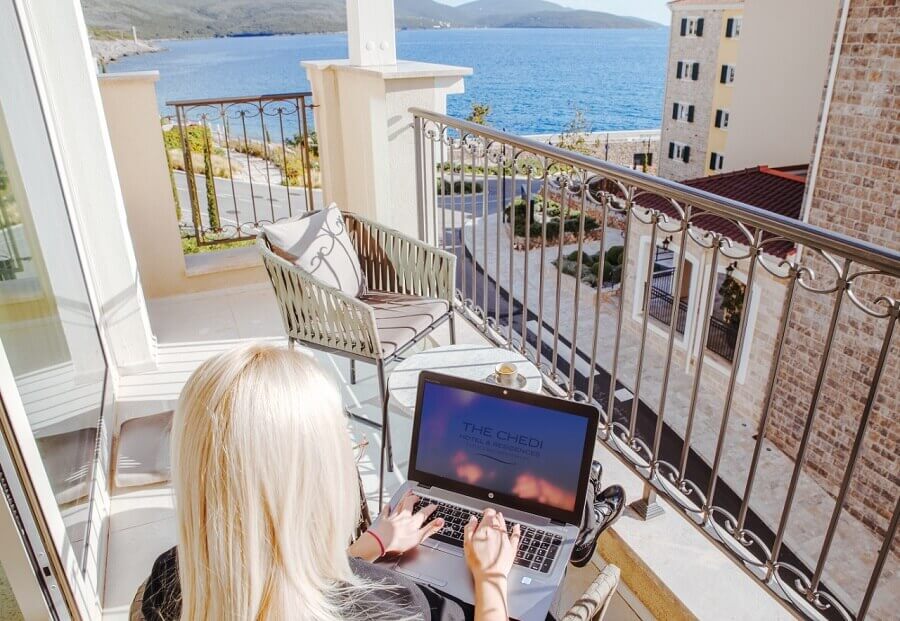
One of the most interesting adaptations to the new realities has been the decision to convert some rooms into office units. These new offices are available for an all-inclusive price of 790 euro a month and unlimited parking and high-speed Internet. Having access to all the hotel facilities and activities, as well as inspiring views such as from this office above, it is one more innovative angle that is already bearing fruit; the first digital nomad has already taken advantage of this offer for an initial 3-month period.
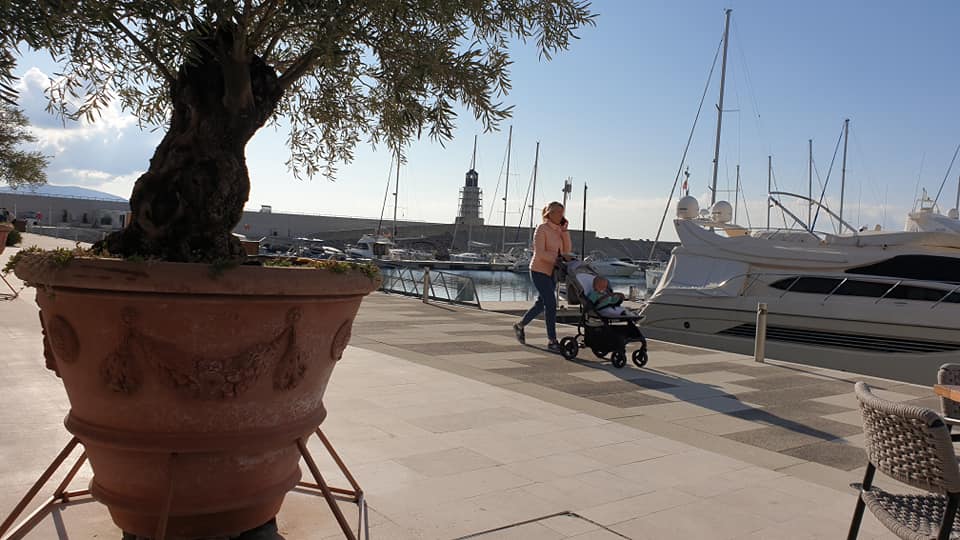
The old normal at the end of 2020. It does exist. Not that epidemiological measures were not in place. They absolutely were, and seemingly adhered to much more strongly than I am used to back in Croatia. Perhaps part of the reason for that feeling was that I did not come across that many people - perhaps 10 in all during our 4-hour quad bike tour, for example.
Just a normal lunchtime on the Lustica marina in mid-November.
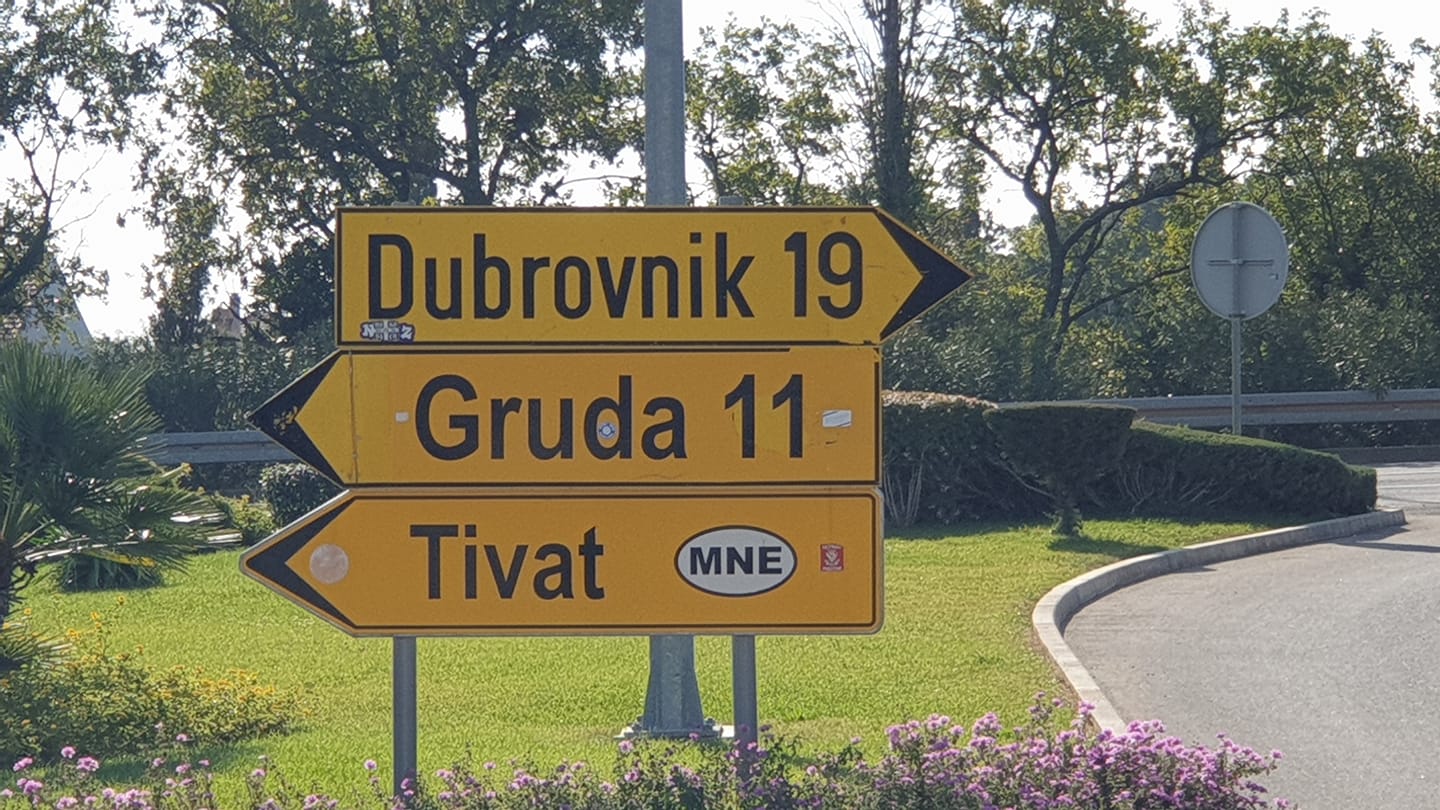
On the drive back to Dubrovnik Aiport, I caught sight of the traffic sign as you leave the airport. Dubrovnik to the right, 19 kilometres, Gruda to the left, 11 kilometres. And below that, some place called Tivat in Montenegro. I smiled.
During my transfer from the hotel, my very friendly driver, a Tivat native, told me about life in Tivat before the arrival of luxury tourism and first Porto Montenegro and now Lustica Bay.
"15 years ago, Tivat was so insignificant that it was not even mentioned on the national weather reports. And look at it today."
Indeed. Back then, the very notion that someone would go from Dubrovnik to Tivat for a weekend to relax would have been laughable. Today, that is a very common occurrence. And now if you travel 10 minutes more, you can explore wild beauty and the old normal. In luxury. A luxury that includes nature, space, beauty and endless fresh air.
I heartily recommend it.
With many thanks to the Chedi Lustica Bay team for arranging my visit and sharing their insights. Learn more about the magic of Lustica Bay on the official website.
(Paul Bradbury was a guest of The Chedi Lustica Bay in November 2020)
Plenkovic Calls on Croatians to Comply with Anti-COVID Rules
ZAGREB, November 12, 2020 - Prime Minister Andrej Plenkovic said on Thursday that Croatia was now at the most difficult stage of the coronavirus epidemic and called on citizens to abide by epidemiological rules to avoid the imposition of tougher restrictions.
Over the past 24 hours, Croatia has registered a record 3,082 new cases of the coronavirus infection and 32 related deaths, the national COVID-19 response team said in the morninmg.
The number of active cases in Croatia stands at 16,348, there are 1,598 COVID patients in hospitals, and 178 of them are on ventilators.
Since start of epidemic 75,922 have caught virus, 58,649 have recovered
Since February 25, when Croatia registered its first coronavirus infection, a total of 75,922 people have contracted the novel coronavirus, 925 of them have died, and 58,649 have recovered, including 2,215 in the last 24 hours. There are currently 35,690 people in self-isolation.
To date, 592,326 people have been tested for coronavirus, including 10,156 in the last 24 hours.
Commenting on the latest coronavirus numbers, the PM told the government that the country was passing through the hardest period of the epidemic.
"It is therefore important to call on every citizen to comply with the measures adopted by the national COVID-19 crisis management team. Those are serious and well-thought-out measureas which bring results."
He said that in the last seven days the number of new infections had risen by 5.5% compared to the previous week.
This indicates stagnation in the number of new infections and this is what we talked about when we said that the latest measures would decelerate the rise in new infections, the premier said.
However, we must be on high alert, primarily due to hospitalisation numbers and data on patients in intensive care wards, he said.
Plenkovic reiterated the necessary activities essential for efforts to curb the virus: keeping a physical distance, hand-washing, and regular airing of rooms, and he underscored that such measures were especially important at private gatherings.
1,213 COVID patients admitted to hospitals, 744 discharged in last 7 days
Health Minister Vili Beros did not attend today's meeting of the government as he underwent testing for the virus, and it was later stated that he was negative.
The health ministry's State Secretary, Zeljko Plazonic, told the government that in the last seven days, 1,213 COVID patients had been admitted to hospitals, whereas 744 had been discharged.
Commenting on the incidence rate, Plazonic said that even though it was registering a mild increase in the number of active cases, Croatia had a rather low number of active cases compared to neighouring countries.
Commenting on the occurrence of the disease among medical professionals, he said that about 1,400 healthcare workers were now diagnosed with the infection, and an additional 913 were self-isolating.
The Croatian Institute of Public Health (HZJZ) has prepared a plan for the implementation of mass vaccination against coronavirus, which includes the monitoring of the process and detection of contraindications.


